#Egypt loves the Eternals
Explore tagged Tumblr posts
Note
How about something we probably haven't had before? The Eternals in ancient Egypt. While the Egyptians were busy treating cats like gods, Thena is trying to secretly populate the Domo with lizards.
"You busy mopin' in here too?"
"I do not mope," Thena corrected as Druig walked in, his black robes dragging behind him. She turned with a frown, "why do you have so many of them with you?"
"Don't ask me, they just-" he gestured, trying to dispel the cats swarming his feet. "Off with ye, y'bastards!"
The cats scattered, off to find their worship elsewhere. The Warrior Eternal couldn't believe how many of them populated the grounds of Egypt's reign. And the creatures were revered--walking signs of godly luck and prosperity, or some such.
"You've made a friend of your own, I see."
Thena looked down at the lizard snoozing in her palm. It was a small thing, but it had slithered up onto her knee without a hint of hesitation. Cold blooded creatures had none of the cautiousness mammals tended to show her. "Perhaps he can sense my distaste for the felines as well."
Druig chuckled, observing the procession from the edge of the pyramid concealing the Domo. "You sure they're not enjoyin' things a li'l too much down 'ere?"
Thena had to smile. "I cannot speak for Makkari. I believe she is thriving, getting the attention she does."
The Goddess herself was being paraded on a dais of all things, despite being able to circle the continent in the time it took the holders to take one collective step. But she waved to her adoring fans, showering her with praise. And of course, the tributes they brought her were her favourite part of their stay in Egypt thus far.
Ajak had ordered her to return everything, or at least leave it in the official treasury so it was available for the peoples' benefit come the time.
"Yeah, she's glowin' like a streak'a lightning," Druig mused, although he had quite a smile on his face as he observed. No matter how bereft of her company he was, he wasn't the type to drag her away from her time of thriving, either.
Thena could sympathise. Gilgamesh wasn't quite as prone to soaking up the attention as the Speedster, and he absolutely couldn't fathom letting mortals carry him instead of walking. But he was also waved to with enthusiasm, praised and adored. His hands held the gift of Ra himself, after all.
Ajak had also ordered Gilgamesh to humour the public, to a degree. Despite his discomfort, she thought that if they wanted to recognise him and Makkari as the beacons of their team this time around then so be it. Makkari and Gilgamesh were warm and mirthful, and perhaps that would encourage this to be a peaceful time for the development of the humans.
"Thena, Druig, what are you doing up here?"
The two Eternals shared a look, as if they were being caught by their mother skipping school. Druig dragged himself to a standing position, arms crossed and hunching as if the gold collar of his robes were weighing him down.
"You should be down there with everyone else," Ajak pointed at the procession. Sersi and Phastos were talking with various leaders of Egypt's developments. "I want this visit to be social for us--and that means everyone."
"I don't see Sprite down there," Thena pointed out with deadly accuracy, even getting a certain look from their Prime.
But Ajak clipped her unruly daughter's statement short, "she's down there. You may not see her, but she is."
"And Kingo?" Druig added, always happy to get himself out of something he didn't want to do.
"Making sure Sprite doesn't wander too far," Ajak elaborated, her voice growing higher as her annoyance increased. She put her hands on her hips, glaring at the two belligerent Eternals. "It's a happy occasion, and we haven't had an attack for days."
Ikaris was on watch regardless. And it wasn't at all because - for once - the humans had no interest in him or his powers, relegating him to 'one who accompanies the holders of Ra'.
Thena found it hilarious that he was acting like a dejected child.
"It's awfully hot," Druig shrugged. "We're still part'a the festivities. Just, y'know, from the comfort of home."
Thena petted her new friend between the prickly peaks atop its head. "He was seeking the shade."
Ajak eyed the Warrior Eternal. "You cannot bring any more of those things onto the Domo."
"I haven't-"
"It can't possibly be anyone else, Thena," Ajak pointed out, and accurately, at that. "They flock to you. And you know they scare Phastos."
"Everything scares Phastos," Druig murmured, although he got a finger snapped in his face for it. He made a face, even leaning back and swaying on his lazy knees. "Fine, fine, we'll go out there and humor the masses, aye?"
"That's all I'm asking," Ajak insisted in her most matronly way. "I finally got Phastos to leave the ship more often, I can't have you two taking over that role."
Thena and Druig both smiled and nodded (the picture of innocence).
Ajak didn't buy it. "Just go."
Druig dropped his smile but did shuffle past her towards the stairs. Ajak looked at Thena, who chose the faster route, turning and leaping off the side of the structure so tall they could see well into the horizon. Ajak rolled her eyes at her most difficult children.
Thena landed steadily, the sand below absorbing much of the shock. It was a high drop, even for an Eternal, but walking the stairs of the temples here took time even one of their lifespan didn't want to waste.
"Why did we build stairs at all if you were just gonna jump out of the windows every time?"
She smiled as the man with Ra in the palm of his hands broke away from the crowd. The farce of a parade continued on without him. "What of your adoring fans?"
"Ah, come on," he fussed, already embarrassed enough. He turned to face them with her, watching Sersi touch the various offerings held out to her, turning them to gold in the blink of an eye. "Ajak told her not to."
"I think she can't help it," Thena laughed faintly. "Ever since we first arrived; she loves the sparkle in their eyes when they see it."
"Who's this guy?" Gilgamesh asked as he slung his arm around her shoulder, leaning against her faintly. He was tired.
"A friend who sought the solace of shade with me," she sufficed to say, still massaging the reptile's spine from side to side.
"Kept her company?" Gil asked the cold blooded creature, who allowed him to tap the top of his head.
"He did." She looked up at him. The sun in Egypt was even more ceaseless here than in their previous homes, she found. And not just ceaseless, but intense.
Gilgamesh blinked as the back of her hand pressed to his cheek. He leaned into it, though. "You feel nice and cool."
"You shouldn't be under the sun for so long," she frowned, feeling his cheek, then his temple and his forehead. "And after you spent all morning breaking and hauling limestone for them."
He shrugged, though. He really was tired; his shoulders looked heavy, like it took great effort for him to raise them. "There's a lot of work to do."
Egypt was evolving rapidly. Of the many civilizations they had seen rise and fall in their time on Earth already, Egypt was likely to prosper and endure. Thena looked at their passing teammates again. "Sersi and Phastos are more than capable of sharing your workload for a day or two."
They were all helping, but Sersi and Phastos were by far having the easiest time with it. Phastos had powers that did the heavy lifting for him, and Sersi could simply turn the slabs of stone into one big seed pod, carry it, and then turn it back to rock once it was placed.
"Maybe."
Thena rubbed Gilgamesh's back, between his weary shoulder blades. "Perhaps you should retire. I'm sure Ajak would understand."
He gave her a smirk. "You mean you want to escort me and my 'injury' back to the Domo so you don't have to be out here for the party?"
"Absurd." Gilgamesh laughed, and so loudly that many turned back to look at them, including their fellow Eternals. But they continued on without him, and Thena smiled at the way his laughter warmed her shade cooled body.
"Y'know, now that you mention it," he postulated, putting his hand to his chin and everything. But there was no containing his bright grin. "I am feeling a bit...whoa!"
Thena laughed as well as Gilgamesh feigned slumping against her shoulder. A human may not have been able to hold him, but he would never drop his full body weight on her without warning, either. "Gilgamesh!"
"Thena, is that you?" he gasped as she started helping him hobble away from the crowd and into the temple. "So weak...I can see the light..."
"You are a terrible actor," she informed him as she got him into the shade.
"Really?" he asked as soon as they were out of sight. "Kingo gave me some tips."
"That was your first mistake."
He chuckled, still with his arm around her as they began walking back to their mothership. "You know Ajak is gonna find him."
Thena looked down at their guest, still lazing in her hand. "If Phastos were not so averse I don't see why I couldn't have one or two. They scurry in of their own accord at least once a day regardless."
"Yeah, and then Phastos gets freaked out, or Sersi thinks it's a rat, and then we have to sweep them out." Gil looked at the little creature again, which opened both layers of eyelids to blink at him.
Thena purred faintly as Gil pressed his lips to the spot where her tiara disappeared into her hair.
"Keep him in my room. Ajak won't think to check there. I'll bring him snacks and stuff."
She angled her head, catching the edge of his jaw with her lips. "Ever a champion of the people."
"Nice try," he brushed off in modesty. His arm drifted from her shoulder to resting his hand at her back. "You are way more important than 'the people' to me."
"You two are bloody disgustin'."
Thena let Druig drag himself past them towards the edge of daylight. "The procession has already passed."
"Well, nothin' I can do 'bout that. Guess I'll head back up-"
"Druig, get outside. You're mingling, and that's that."
Ajak also hustled past them, her deep blue robes breezing behind her petite figure as she all but dragged Druig out with her by the arm. Perhaps in her mission to make Druig more acclimatized to human socializing she had forgotten Thena had also been ordered to 'mingle'.
Gilgamesh nuzzled her hair again, whispering, "I think we got away with it."
Thena hummed, starting up the stairs towards the Domo with him, and their new friend. "Seeing that you both get some rest is more important in this moment."
Gil cupped her hands in one of his, adding to the bed of luxury for the humble lizard. "I think we'll both rest better if you join us."
#Thenamesh AU#you're so right bestie#thank you so much for the ask!!!#I have long thought that the Eternals would thrive in ancient Egypt#they would love Kari of course#and Ajak#and Sersi transmuting gold everywhere because she can't help herself#and Gil is very much a sign of patriarchal strength for them#but he's also just a sweet cute shy dude#they offer to fan him with palm fronds and he's like guys really thanks but I'm good#meanwhile Makkari is being hand fed individual grapes#Druig is like are you serious?#Makkari: *are you gonna take off your shirt and fan me instead?*#Thena just wants to have some little friends#this is like if you were on vacation and there were puppies or kittens everywhere you went#except for Thena it's horned lizards and other reptiles#Gil doesn't really care for them but he knows she loves them#so when he comes back to his room and finds more and more and more lizards he's just like#my wife is happy that's all that matters my wife is happy that's all that matters my wife is-#It makes a great reason for Thena to be in Gil's room all the time#even more than before#also Ikaris is totally feeling dejected#Egypt loves the Eternals#but then Ikaris is like what about me? and they're like ugh show off flying and such#also they love Sersi and they think he harshes her vibe so#and Ajak having 3 moody antisocial teenagers to manage#except they're all grown eternal beings with attitude
16 notes
·
View notes
Note
wait do you believe in hell as eternal conscious torment? (im curious bc that debate has been a crux of my own journey w faith & christianity)
I believe in hell as eternal disconnection from God or more precisely as defined by the Catechism a "state of definitive self-exclusion from communion with God and the blessed" (CCC 1033). How that would look like i have no idea but i do know that tearing yourself apart from the one and only source of life, love, happiness, fulfilment, goodness, and everything that is good would absolutely be the worst torment imaginable, or rather well, unimaginable. And i do know God would hate to have His beloved children be in this state. I hope with all my heart that hell is completely empty, i wouldn't wish it upon anyone and i mean anyone
Oh and since you mentioned a debate, can you tell me more about it? Cause i'm not sure what you're refering to and i'd love to learn more! God bless you anon and best wishes for your journey with faith!
#i worry sometimes that i don't do enough to help save my siblings in Christ from hell#sometimes i have this secret tiny hope that at the end of times when God comes to judge the living and the dead#that They will find a way to save souls in hell too#if there are any souls in hell by then that is#i know this could go against free will if the souls have consciously chosen to be damned forever#but maybe there's a way? an impossible illogical way accessible only to God?...#the truth is we have no idea what the eternal life is like and probably all this pondering is non-applicable anyway#yknow i always interpreted God's Judgment on Egypt and its gods in Exodus and killing the firstborns as Him coming to them and just#showing His real divine face like He *almost* did with Moses and saying “I love you. Which God do you want to worship now?”#and i can't imagine them do anything else in this moment than give up their previous “gods” and praise Yahweh#they would ofc die because God's face but they would die most blessed death and see Him and be happy with Him forever#and it gives me hope that maybe He judges other people the same way when they die idk#i'm rambling again#christianity#catholic#ccc#hell
10 notes
·
View notes
Quote
That which is the Fundamental Truth, the Substantial Reality is beyond true naming but the Wise men call it The All.
Muata Ashby, Egyptian Yoga:The Philosophy of Enlightenment
#the all#enlightenment#greater reality#truth#awareness#consciousness#mystery schools#egypt#feeling#thinking#connection#oneness#attunement#intuition#soul#spirit#life#awakening#eternal infinite love#divine spark#source
10 notes
·
View notes
Text
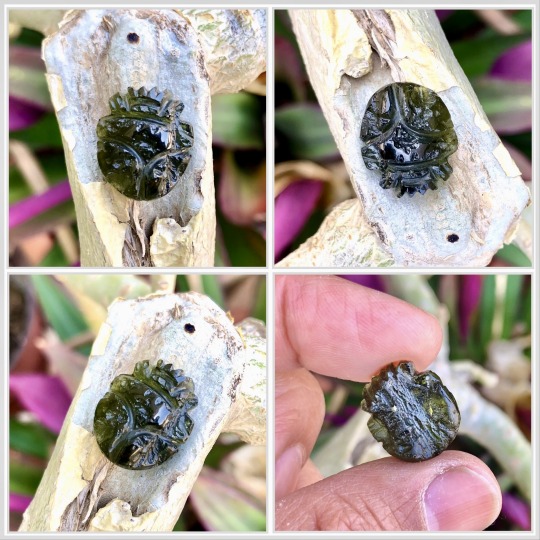
Presenting one more moldavite carving piece and this time it’s scarab beetle carving and its hand carved using traditional carving hand tools.
The dimension (size) of this piece is:
Length: 17.20 mm, Width: 15.00 mm, Height: 9.30 mm
Scarab beetle symbolism is used throughout the history in many culture and civilisations with theme of creation, rebirth and transformation. A perfect gift for those seeking the fusion of Earth elemental energies with the Cosmic energies.
Specifications:
100% authentic moldavite and carving is done by hand §
#moldavite#authentic#czech#green#original#hand crafted#scarab beetle#meteorite#symbolism#ancient egypt#eternal life#lifeforce#cosmic love#cosmic energy#spirituality#spiritual journey#art#freeshipping#shopsmall#artsystudiofinds#etsyfinds#etsylove#etsy#ancient wisdom#valentines#gift ideas for him#gift ideas for her#unique gifts#rare collectibles#collectable
0 notes
Text
Ezekiel 29:20 What Could God Give you?
“I have given him the land of Egypt for his labor, because they have worked for Me”, says the Lord God. Ezekiel 29:20 Businesses all over the world have workers that work for them. As a result of a person’s work, the business owners will pay the worker a set amount of wages. Occasionally many businesses will also give bonus pay for the work being done or for extra quality of work. Along with the…

View On WordPress
#all needs#Contentment#Eternal Life#Ezekiel 29:20#Forgiveness#given Egypt#God gives#Joy#love#Nebuchadnezzar#Wages#Work#Working For God
0 notes
Text
"Priestess of Isis", "Enchantress" and "Sylph": Occult References in Ellen Hutter’s character in “Nosferatu” (2024)
In another post I analyzed Ellen Hutter’s character in the 2024 adaptation of “Nosferatu” through literary lenses of the Gothic female genre. Now, I want to dwell on her occult and mystical symbolism, and how this translates in her connection with Count Orlok, the undead demon of the story, who’s bound to her. But how and why? And what exactly is she in this story?
“In heathen times you might have been a great priestess of Isis.”
Von Franz tells this to Ellen in their last scene together, because he recognizes her spiritual power and ability to communicate with the spiritual world. Her “hysterical fits” and “epilepsies” also mirror the trance-like states of Pagan priestesses. She inhabits the “borderland”, a peripheral area, a portal between the two worlds: the physical (matter) and the spiritual.

“The pupil is expanded. It does not contract naturally to the light. […] A second sight. She’s no longer here. […] She communes now with another realm.”

“Somnambulists afflicted with these perversions [hysterics and lunatics] oft possess a gift: a sight into the borderland. […] I believe she has always been highly conductive to cosmic forces, uniquely so.”
Von Franz says demons usually obsess over “those whose lower animal functions dominate”, because they like them and seek them out. He elaborates: hysterics and lunatics. However, he says this before he actually gets to know Ellen, and he quickly realizes that’s not the case here. Because Ellen is the one who awoke Orlok from his centuries old sleep. Which is confirmed by three characters in the narrative: Orlok, Ellen herself and Von Franz.
O’er centuries, a loathsome beast I lay within the darkest pit… ‘til you did wake me, enchantress, and stirred me from my grave. You are my affliction.

Which leads me to the next topic:
Why Isis, of all deities?
Isis and Osiris
Isis is one of the major Egyptian deities. She’s more commonly known for her role as “Mother Goddess” of Horus, the Sun god. Isis had mighty magical powers, greater than that of all other gods, she governed the natural world, healing and wield power over Fate itself.
“Destiny!” Ellen cries out to Anna, while looking at the sea. “Providence!” Herr Knock screams throughout the narrative. “You run in vain! You cannot out-run your destiny!” Von Franz laughs in religious fervor as Thomas tries to save Ellen.
Isis is also connected with the themes of death, sex and rebirth in Egyptian cosmology, due to the myth of Isis and Osiris; which are also the core themes of Robert Eggers’ adaptation of “Dracula/Nosferatu”, so it’s not coincidental.
The “Osiris Myth” is one of the major surviving pieces of Egyptian mythology. It’s a ancient tale, with its early versions dating back to the 5th Dynasty (c. 24th century B.C.). It has known several adaptations throughout Egyptian history. The most complete version is in “The Moralia” by the 1st-century scholar Plutarch of Chaeronea, a collection of essays about Greco-Roman culture; that became very popular during the Renaissance era (14-16th centuries) and the Enlightenment period (18th century) in Europe.
Isis and Osiris were brothers, and according to Ancient Egyptian religion, they were in love with one another before they were born, and enjoyed each other in the dark before they came into the world. They eventually married.
Osiris had two facets as a God: in life, he was the God of fertility, agriculture, and vegetation, being considered a “Shepherd God”; in death, he was the God of the Underworld, the judge and Lord of Dead, the afterlife and resurrection. The pharaohs of Ancient Egypt were associated with Osiris in death, because as he rose from the dead, so would they unite with him and gain eternal life through imitative magic. Which appears to be the whole deal between Orlok and Herr Knock in “Nosferatu”, as Knock seeks to gain immortality like Orlok, by serving him.
On Earth, Osiris was believed to take on the form of a bull (the sacred bull Apis). What I find interesting here is that in both the 2016 script and the 2023 script of “Nosferatu”, Orlok’s physicality is actually compared to a bull:
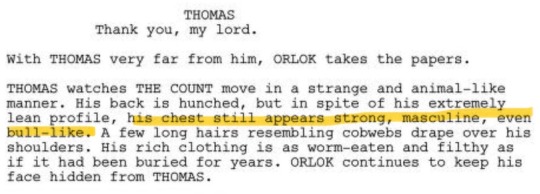

Osiris became king of Egypt, and taught the people how to farm and live peacefully in their villages; he had a reputation for being a powerful and wise king, loved and respected by the Egyptian people. We don’t know exactly how Eggers’ Orlok was in life, other than him being a Romanian or Hungarian nobleman and a Solomonar sorcerer who sought to achieve immortality. But if we go by Vlad III (Drakule or Dracula, the infamous “Vlad the Impaler”) biography, he’s actually considered a Romanian national hero because he defended the Romanian people from foreigner invaders (Germanics and Turks, mostly). Just throwing this out there, because it’s unsure if this is intentional or not.
Osiris and Isis had a brother, Seth (or Typhon in Plutarch essays), the God of deserts, storms, disorder and violence, who murdered Osiris to take his throne. He tricked Osiris into climbing into a wooden chest/coffin, shut the lid, sealed it shut, and threw it down the Nile River, knowing Osiris would never be able to survive. In some versions, it’s said Seth cut Osiris body into pieces and scattered them throughout Egypt. Interestingly enough, there’s a similar legend associated with Vlad the Impaler, who died in battle against the Ottomans, and, according to Leonardo Botta, the Milanese ambassador in Buda(pest), Vlad’s enemies cut his corpse into pieces, too. and his remains were never found.
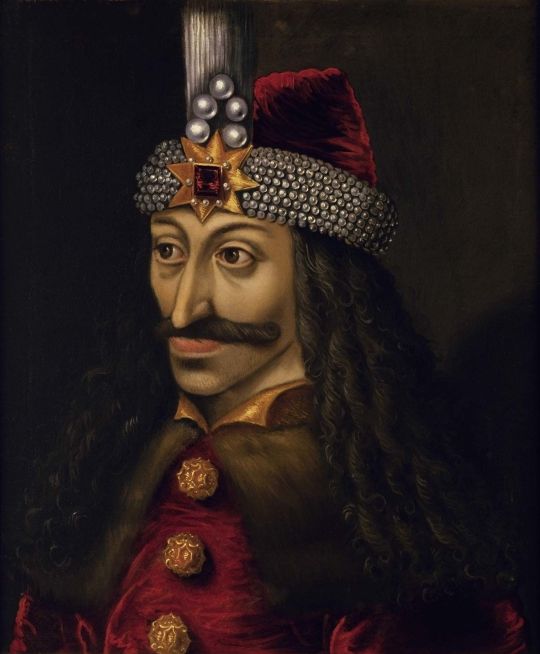
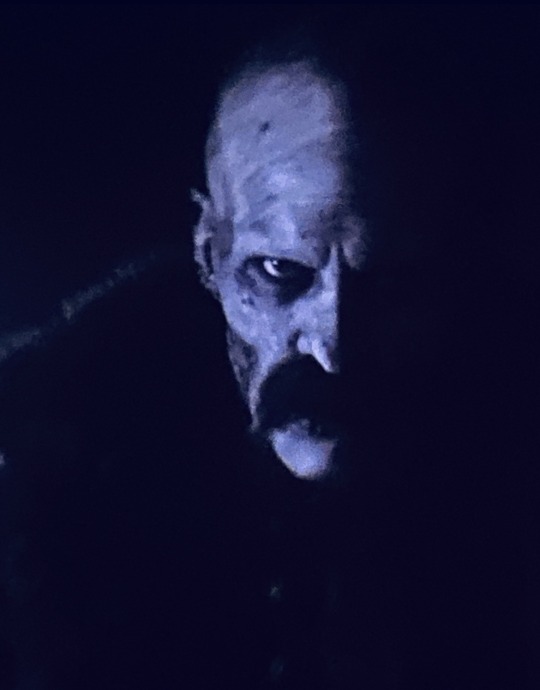
Isis is the epitome of the mourning widow in this myth, as she mourns Osiris’ death deeply. Here enters the symbolism of the lilacs in "Nosferatu", the symbolic flowers of Ellen and Orlok: in the Victorian era, they were associated with widows because they represented a memento of a deceased lover.
Can this also be a nod to “Bram Stoker’s Dracula” (1992) by Francis Ford Coppola? Where Dracula himself is the grieving widower because Elisabeta commits suicide? In the 1992 adaptation, Mina also speaks of ���flowers of such frailty and beauty as to be found nowhere else”. What flowers is Mina talking about? It’s unclear, but Lilacs are native flowers to the Balkans, after all.
Isis sought for Osiris’ mangled body and with help of tree other Gods (Nepthys, Thoth and Anubis), they sew Osiris’ body back together, and then wrapped it head to toe in strips of linen, creating a mummy. Interestingly enough, Orlok’s corpse appears almost mummified at the end of the story.

In the Osiris myth, Isis uses powerful magic (incantations and magic spells) to bring her dead lover back to life; similar to Ellen who resurrects Orlok with her summoning prayer. In one version, this happened on a night of the full moon; in “Nosferatu” (2024) we also have a full moon connected to Ellen and Orlok, in the prologue, when he reveals his rotten corpse to her:
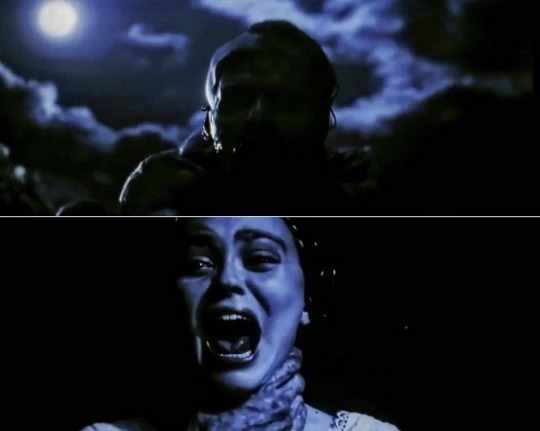
According to Ancient Egyptian funerary texts, it’s Isis sorrow, sexual desire and anger that empower her magic to be able to bring Osiris back to life. When Ellen prays for a companion of “any celestial sphere” in the prologue, she’s crying (sorrow), she’s upset because her father recoils from her now that’s she’s no longer a child (anger) and she’s in her teenage years/puberty (sexual desire). Like Isis with Osiris, it’s the combination of these emotions that power her magic to unconsciously resurrect Orlok.
However, Osiris can’t remain among the living, because he has to return to the Underworld and become King of the Afterlife. But before he goes, Osiris and Isis conceive Horus, the God of the sun and the sky, who will restore peace and order to the universe. In “Nosferatu” (2024), Von Franz says that “with Jove’s holy light” before dawn, redemption will come to the people of Wisburg and the curse of Nosferatu will be vanquished. “Jove” is Jupiter, the “King of the skies”, who’s connected with the Egyptian Horus. Horus and Ra are often merged together in Ancient Egyptian religion, making Isis and Osiris the metaphorical parents of the Sun.

In “Nosferatu” (2024), as Orlok and Ellen complete their covenant, consummate their wedding and he drinks from her, the sun is also the metaphorical result of their union. As dawn breaks, the sunlight vanquishes them both from the physical world, as they both die in the material realm.

After being buried by Isis, Osiris goes into the Underworld to rule over it. And from then on, Isis herself is also associated with funeral rites, as she would guide the souls of the dead, helping them entering the afterlife. Through her magic, Isis helped resurrecting the souls of the dead, as she did with Osiris, acting as a mother to the deceased, providing protection and nourishment.

At the end of "Nosferatu" (2024) we see Ellen fulfilling her role as “priestess of Isis” (or as Isis herself?), as the Goddess of healing, who ends the blood plague in Wisburg, but also guides her dead lover Orlok/Osiris with her into the Underworld... where he'll rule as king? Unclear.
Since we are discussing the Egyptian Gods, I have to mention Greta the Cat, Ellen’s domestic cat. Her name is an obvious homage to Greta Schröder, the actress who played Ellen Hutter in the original 1922 “Nosferatu”. Indeed, cats are predators to rats, however, the Egyptian Goddess Bastet is considered to be Isis’ daughter. She's the "cat goddess" for cats were considered sacred in Ancient Egypt. Bastet was associated with sun gods like Horus and Ra. Bastet was the goddess of pregnancy, childbirh, and protection against contagious diseases and evil spirits.
Enchantress
Orlok calls Ellen “enchantress”, but what does this mean? “Enchantress” is not only a female archetype, but has root in historical realities. Enchantresses were practitioners of feminine magic: oracles, healers, herbalists, midwives and shamanic shapeshifters. They were what’s commonly known as “witches”. These female magicians studied and practiced their art in goddess temples, mystery schools, alchemy schools and hedge schools.
The alchemists of the Middle-ages studied these dynastic lineages of “wise women”, and they had several names: enchantresses, chantresses, encantrices, or incantrix. Many physicians who founded "medicine" and "science" studied these wise women, mainly healers and their use of medicinal plants and herbs.
Ellen’s character appears to fit that of a “incantrix”. Women who used words, incantations, songs, spells and prayers to shape reality. It’s the priestess of an old religion (as Von Franz also calls her); gifted with magic power and authority to command the elements or the body by the power of their word.

Heptagrams
Orlok seal (or sigil) meaning has already been widely discussed by others (symbols of Ancient Dacian religion, mainly the figure of Zalmoxis), but what I want to mention here is the heptagram itself, the seven-pointed star. Heptagrams have several occult meanings, including warding off evil which, for obvious reasons, doesn’t fit Orlok’s character. It has meaning in Alchemy, too, as representative of the seven planets and seven substances.
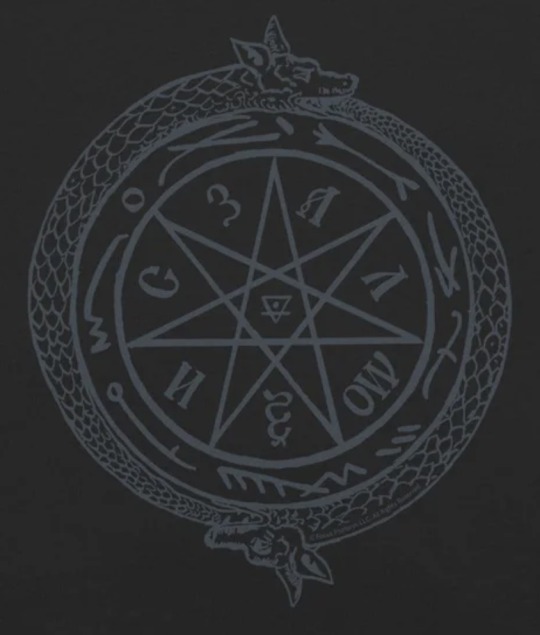
The heptagram, however, is used by Aleister Crowley in his occult system Thelema (from Ancient Egyptian text) to represent a goddess/archetype: Babalon, which is also connected with Isis, Nuit, Lilith, Kali, among other goddesses and deities. At its core, it’s a goddess of female empowerment and liberation, of divine feminine. According to this occult belief, Babalon has several manifestations (sort of incarnation) and is a spiritual gateway to wisdom and enlightenment through chaos and female sexuality.
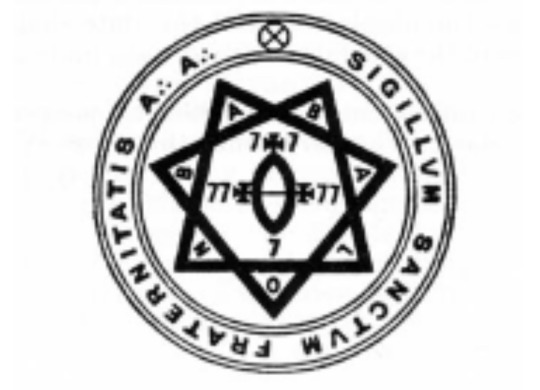
In “Nosferatu” (2024), when Ellen and Thomas are returning home, there’s a man in the streets rambling bits from the “Book of Revelations” (Apocalipse) from the Bible: “And I saw a beast rising out of the sea, owith ten horns and seven heads, with ten diadems on its horns and blasphemous names on its heads.” (Revelations, 13:1).
Indeed this passage is about Orlok arrival and how he’ll spread plague among the town. However, we have a character in the “Book of Revelations” which is connected to all of this: the Whore of Babylon, the “Mother of Prostitutes and All Abominations of the Earth”, and she rides this Beast, which is the same as Crowley’s Babalon. What Crowley did was a positive reinterpretation of this biblical figure, symbolizing liberated female sexuality by embracing the powers of the Divine Harlot.
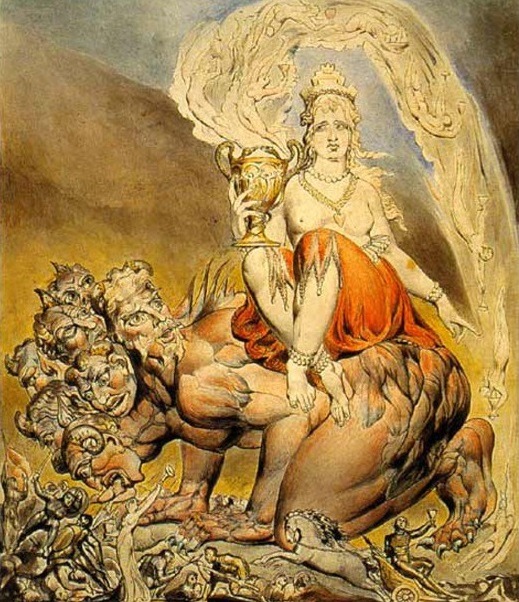
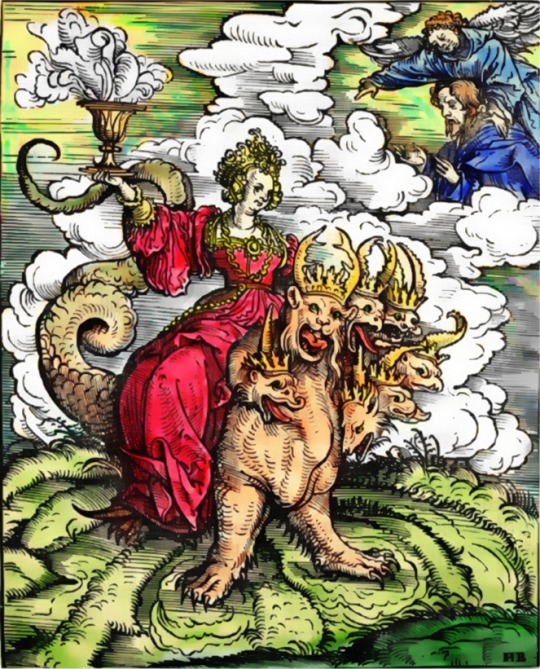
Also known as the “Scarlet Woman” and “Great Mother”, this complex and mysterious figure was established in 1904 in “The Book of Law”, however her roots are far older, and can be found in the Enochian tradition, a magical system by John Dee and Edward Kelly, dated from the late 16th century. In the 2016 script of “Nosferatu”, Orlok spoke Enochian, so it’s clear Robert Eggers is very much aware of all of this.
Initiatrix, Creator and Destroyer, Babalon is the “Great Mother” because she represents matter, Mother Earth. Like Isis, she’s the Archetypical Mother, the Womb, the Great Sea and the Divine Blood itself. According to Crowley, the “whore/harlot” facet is about enjoying sex without the burden of reproduction; and the “mother of abominations” connects with destruction like natural catastrophes, plagues, etc. She’s the ruler of the cosmological sphere and both good and evil (as evil as elemental forces can be or are considered as).
Crowley is a man who was born and raised in the Victorian era where sexuality was to be silenced and repressed, which provides context to his occultist beliefs and his “sex magick” theories. Victorian physicians and scientists were obsessed with classification of sexual perversions, too. “Hysteria” being one example among many. Which is the historical context for Eggers adaptation of “Nosferatu”/“Dracula”, so these references are quite fitting.
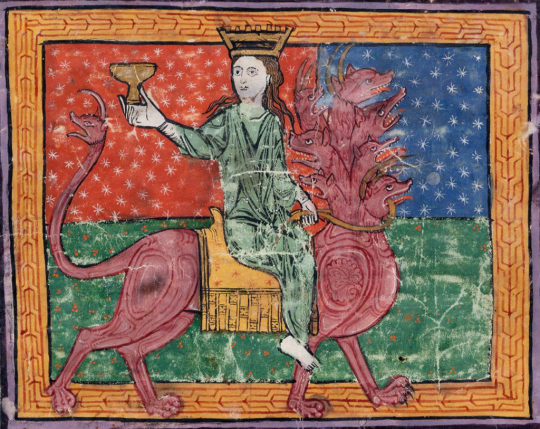
According to the Thelema, Babalon is the “Sacred Whore”, and her primary symbol is the Chalice or Graal (symbolic womb). She’s a consort to the Beast, who has seven heads, which is symbolically represented in her heptagram sigil. Crowley described her: “She rides astride the Beast; in her left hand she holds the reins, representing the passion which unites them. In her right she holds aloft the cup, the Holy Grail aflame with love and death. In this cup are mingled the elements of the sacrament of the Aeon”.
To Crowley these were not actual beings but titles/archetypes (sort of speak) in his Sex Magick beliefs: the “Scarlet Woman” is the High Priestess, and the “Beast” is the Hierophant. This fits Ellen (the priestess) and Orlok (warlock, black sorcerer) in “Nosferatu” (2024). The “Scarlet Woman” is a gateway to both the moon and the sun, and we see both associated with Ellen.
Orlok is described as a “beast” several times in the film, including by himself and by Von Franz, who also mentions Ellen’s “dark bond with beast”, and how she gave her love to the beast: "and lo the maiden fair did offer up her love unto the beast, in close embrace until the first cock crow, her willing sacrifice thus broke the curse and freed them from the plague of Nosferatu."
Orlok says Ellen’s passion is bound to him, like Babalon’s passion is united with the Beast. Babalon as “mother of abominations” also fits with how Ellen unleashed Orlok and his blood plague onto the world, bringing destruction and apocalypse.
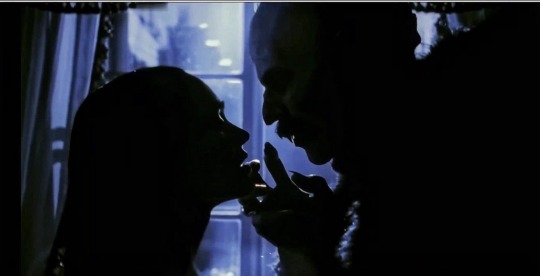
Your passion is bound to me. […] I cannot be sated without you. […] Remember how once we were? A moment. Remember?
Thelemic followers of the Beast have been trying to call into being an older, more primeval, female force that is lacking in the Modern Age. Interestingly enough, this was the reason why Orlok became interested in Ellen in the 2016 script (which was later changed, because in the 2023 version it’s Ellen who summons Orlok): “I have sought a creature from the depths. A Eve that remembers her Eden. You are such one.” Both Crowley but more notoriously Jack Parsons have tried a bunch of incantations to conjure Babalon into being.
Oddly enough, the conjuring ritual we see Herr Knock performing at the beginning of “Nosferatu” (2024) is very similar to one of the incantations of Babalon performed by Jack Parsons: Air dagger, blood and channeling of windstorms and the Air element, over a heptagram. He also compares Ellen to a sylph; a nymph of the air element from alchemy and hermetic literature. We are told by Von Franz this is Solomonari sorcery, but is it really?

In Ophidian Thelema, Babalon is the Goddess of magick (“Heka”), of the Liberation of the Spirit (ecstasy), of the Liminal Point, of the Underworld, of Vengeance and of the Principles of Life. Their priestesses use the female body (vulva and womb) to channel their power during their magic rituals. This is similar to Ellen’s “hysterical fits” when she’s communicating with Orlok in the spiritual world, especially since “hysteria” was considered a disease caused by “wandering womb”. In the film, we also see Ellen's womb being talked about between Von Franz and Dr. Sievers during her examination, when they say her menstruation is liberal and she has too much blood in her.

The “liberation of spirit” is in the form of a Serpent, which manifests in the flesh. This notion was present in the “Book of Law”, where its said there’s the dove, and there’s the serpent, and a choice must be made. While the dove represents religion, the serpent represents the spirit. In one scene, Ellen says Orlok is like a serpent in her body; and he replies it’s not him, but her own nature, a nature she denies. Babalon says “my vocation is the serpent.”
The priestesses of Babalon are also in control of their “trances” when they access the spiritual world. In “Nosferatu” (2024) there’s a interesting scene between Ellen and Thomas (the infamous sex scene), when Ellen “comes back” from her transe when he says he’ll call for Dr. Sievers. Does this indicate Ellen is actually in control of her trance-like states?
Babalon is the guardian of the Seven Principles of the Underworld, a place of darkness and transformation. Orlok tells Ellen in the prologue “you are not for the living. You are not for human kind.” Babalon is also the goddess of the liminal point, who can access other realms. As Goddess of vengeance, Babalon punishes when life is out of balance, and exerts violence and corruption upon those who are in the wrong. Ellen unleashes Orlok onto the world, and we can interpret him bringing plague into Wisburg as Ellen’s reckoning against a society that ostracizes her and will never accept her.

All rites and initiations of the Underworld Goddesses include rites of sex and death. Which is what we see with Ellen at the end of “Nosferatu” (2024). By Thelemic occult tradition, she, the manifestation of Babalon, has sex with the Beast (Orlok), “representing the passion which unites them” and her womb (Holy Grail; cup) is “aflame with love and death” (sexual climax, orgasm, with an un-dead vampire).
I will work the work of wickedness; I will kill my heart; I will be loud and adulterous; I will be covered with jewels and rich garments; I will be shameless before all men; I will, for token thereof, will freely prostitute my body to the lusts of each and every living creature that shall desire it; I claim the Mystery of Mysteries, BABALON the Great, and the Number 156, and the robe of the Woman of Whoredomes and the Cup of Abomination. “The Great Beast: The Life of Aleister Crowley”, John Symonds, 2016

Orlok being the Beast and Ellen the manifestation of Babalon explains why she’s promise to him in the narrative, and was never meant to marry Thomas: in Thelemic tradition, the Beast is the consort of Babalon, after all. Orlok's interest in Ellen isn't predatory for its own sake; he sees her as his rightful and fated spiritual consort, which fits the "bride of Dracula" theme of the Bram Stoker original story.
This probably also mirrors the 1992 adaptation by Francis Ford Coppola, where Van Helsing calls Lucy the “Devil’s concubine”: "Hear me out, young man. Lucy is not a random victim attacked by mere accident. Do you understand? No. She is a willing recruit, a breathless follower, a wanton follower. I dare say, a devoted disciple. She is the devil's concubine! Do you understand me? Yet, we may still save her precious soul." In this adaptation, Lucy is full Crowley and Parsons “Scarlett Woman”, with red garments and red hair.


Orlok also gives Ellen three nights to accept him/her nature and complete their covenant. Some are mistakenly associating this with Jesus Christ. These “three days” are possibly connected with another Goddess associated with Babalon: Inanna (or Ishtar), the ancient Mesopotamian Goddess of love, war, fertility, sensuality and divine law. The most famous myth about this deity is her descent into the Underworld, where she spends three days and three nights dead, until she re-ascends (rebirth).
Ellen also goes through the “Myth of Inanna” in “Nosferatu” (2024), which is the theme of the heroine descending into the “Underworld”, to suffer, to be stripped bare, to die, and to be reborn in the aftermath. This is the primal Shamanic crisis. Ellen also goes through three days and nights of suffering and death (witnessing her friends and the townsfolk of Wisburg dying by the blood plague) until she joins Orlok and is reborn.
Ellen and Orlok are involved in sex magick, at the end, clearly. But with what purpose? Sex magick to Crowley has several purposes and strong creative power, conjuring, invocation, etc. He believed deliberate acts of sexual transgression were a radical form of super-human power that promised to explode the narrow boundaries of Western Christian society and open the way for a whole new era of human history. Which is probably what’s happening here? A symbolic ending to the sexually repressed Victorian era as Western societies moved toward a more open-minded and accepting view of sexuality? Or it’s Ellen reborn as a Goddess of the Underworld (return to spiritual state), after going through a initiation rite of sex and death, as she breaks free from her human form? Or both?
Or it can be a nod to Crowley idea of sex magick to unleash supreme creative power to generate a godlike child? This can mirror the Osiris and Isis myth, of Horus (the Sun) as their metaphorical child, like it is for Ellen and Orlok here, as the end result of their union.
Alchemy
Alchemy, at its core, is the transmutation of base materials (lead, etc.) into noble materials (gold), and the pursuit of immortality (“philosopher’s stone”). Occultists reinterpreted this as a spiritual quest of self-transformation, purification and regeneration of the human soul. Hence physical death being seen as a gateway to another life (rebirth); which is the symbolism of the final scene of “Nosferatu” (2024).

Both Ellen and Orlok evolve from a diseased and corruptive state (physical world) into regenerative and perfect state (spiritual world), after being purified by fire (the Sun). Their old selves are empty shells, as their spirits ascend. This also finds parallel in the myth of Isis and Osiris, as they both went from “daemons” to Gods in the Plutarch essay.
And this also finds parallel in the 1992 adaptation when Vlad/Dracula ascends to the Heavens and is reunited with Elisabeta’s soul. Is this intentional? Are we dealing with reincarnation themes in Eggers' adaptation, as well? According to occultists both Babalon and the Beast have had many manifestations (reincarnations) in the physical world throughout the centuries, after all.

Orlok asking Ellen to remember their shared past, is also an interesting nod to Vlad and Mina in the Coppola's adaptation (their OST is called "Love Remembered"): "I have crossed oceans of time to find you." and “I have sought a creature from the depths. A Eve that remembers her Eden. You are such one.” in the 2016 "Nosferatu" script. Which didn't change all that much in 2023, except we don't have an actual explanation for Orlok interest in Ellen, other than her waking him from his centuries old sleep (resurrection).
#nosferatu 2024#robert eggers#ellen hutter#count orlok#lily rose depp#bill skargard#von franz#dr sievers#ellen x orlok#orlok x ellen
241 notes
·
View notes
Text
⁺‧₊˚ ཐི⋆DROLTA TZUENTES⋆ཋྀ ˚₊‧⁺ | THE DEMONESS (castlevania: nocturne)
—



“Solar Prominences” (Drolta Tzuentes x Fem!Reader)
| Drolta has been going down a path, long enacting a plan, that you wish you didn’t have to take. Even still, you’d follow the love of your immortal life all the way to the end, even if it killed you.
| SFW, established relationship, angst, some comfort, murder, alatrism, Egypt, this reader-insert does not like Erzsebet, exposition heavy - vampire!reader
| Also not Drolta highkey being a soucouyant. I love it, don’t get me wrong, but I truly do not understand some of the design choices made for her character from a creature standpoint. SEASON TWO SPOILERS. (Pic source: Castlevania: Nocturne - “Devourer of Light” S1EP8)
| 2k+ words


Night Eternal.
The sun: eaten.
Wide eyes stare ceaselessly at the covered sun and darkened sky. Your gaze bouncing all over the stretched corners of Earth’s world above and all your brothers and sisters of the vein soaring through the air during what should’ve been noon.
On the rooftop you’ve since claimed a woman lands behind you.
You hear the jingle of Drolta’s jewelry before she properly announces herself.
The subtle clack of her hoofed heels and flap of her wings come next. Then the whoosh of her hair, the open sound of her flames dying down, registers to your ears.
Arms crossed, you drum the sharp points of your nails against the brown expanse of your skin, brows lifting.
“What did I tell you, my Sweet?”
Quiet, you swallow the residual blood in your mouth from the Noblewoman you’d snatched from her carriage the moment darkness overtook the sun. Earlier in the week she’d likened your hair to the ‘dirty’ swamp moss she’d encountered during her visit to Louisiana; cockier around you than she should’ve been despite knowing what you were, too caught up on her pretend version of what the ‘natural order of things’ was.
So ‘naturally’ you drained her gaunt, and then turned to her handmaiden because even after her you’d still found yourself peckish.
These French and their ridiculous dedication to aesthetics. Absentmindedly, you flick a bit of severed flesh from your cleavage; so unnecessarily skinny the lot of them. You missed when aristocrats (even dedicated to not washing as they were) weren’t afraid to have a little meat on their bones to showcase their upper status.
Originally, you’d been planning on snatching her from her sleep after a bit of antagonism once true nightfall fell later today but you couldn’t complain about cutting short the restless anticipation that had before now had nothing better to do than fester restlessly under your skin.
“To believe,” you say at last, still chasing faint crimson with your tongue. Blood had a tendency to get trapped in the grooves of your fangs.
To believe in her impossible woman. In her false Vampire Messiah and her aggrandizing power grab.
Your brows furrow back over your dark eyes all over again.
How many years had you been by her side before Erzsebet even came into the picture, only to be cast as second priority to Erzsebet’s blood thirst and unwavering desire for conquest?
“Yes,” the corner of Drolta’s lips twitch upwards; not quite a smile for you, not yet. “And do you finally? Believe in our Messiah?”
Belief.
Faith.
What nonsense dogma. Such hollow promises.
You’d watched Sekhmet burned by the Christians, temples fallen, and faithful followers scorned without mercy. And through it all no worship had helped, no amount of sacrifice, or fighting, or tears.
No, your only constant had been Drolta and then a smear of seemingly never ending darkness atop your soul.
By the end you had learned your lesson, and yet still Drolta had failed to follow your lead. She’d clung to hope of blood possession and resurrection after you’d found yourself displaced from the safety of your lover - from Egypt - and shipped off in stacks of blood and sorrow and feces.
Still, you step back to turn from the building's edge. Drolta has always craved a higher purpose as long as you’ve known her. A ruthless, hands on way to worship and be rewarded in turn; her insistence of the same now was really nothing new bar your less than tolerant reaction towards it.
You weren’t too cocky to be unable to admit that you were…impressed, however.
She’d managed a lot with her bloodthirst and ever present plotting, broke the sun even.
What a miracle she’d orchestrated.
A hundred plus years on this neverending plane and finally something had managed to surprise you.
To yourself, you smile. Hide the tiny upturned corners of your mouth as you turn to your lover, hand an extra barrier from her gaze as you pass it through the air to sweep your cloud of thick curls over your shoulder. It cascades down the length of your back till the tips hang just past the rise of your backside, purposefully the opposite of the types of updos the French thought so favorably of for their women because you were not one of them and held no desire to be so either.
To Drolta, you give a steady look.
Following hasn’t been your particular cup of tea for the better half of multiple centuries. It only took so many years of being beaten to kneel for you to grow an aversion to its systematic use and the often heavily adorned, sometimes pale, faces who’d looked down at you in the thick of it.
And even still you hardly kneeled for Drolta unless the exchange was neutral. A natural cycle of give and take. Power exchanged willingly, participation optional.
Submitting yourself to a God’s whims, false or not, was the type of uneven exchange you preferred not to buckle for. Not anymore.
Not, especially, when it was Drolta’s bastardized Messiah.
Drolta should know that better than any soul still alive enough to tell the tale. You had not been modest about your aversion to submission during her time snatching displaced disciples from the European islands, you’re sure even that very passion had been what had drawn her so succinctly back to you in the first place.
And yet she asks you for your belief with such poorly hidden satisfaction, like all you had needed to give yourself wholly to a bitch you didn’t trust as far as you could hurl her into the sun to burn forever was Báthory making a bigger spectacle of herself than usual.
Oh how you miss the days when you’d both only existed for fucking and fighting and being free. Gorging yourselves on blood and death, beholden by your love for one another alone, and slaughtering your way through sands and snow and the King’s poorly controlled conquests before returning back home.
The raiders had already come and Sekhmet’s body had since been lost. Drolta had survived their merciless slaughtering of her sisters, and you had been brought in down the line to help her lead. To help her search.
Drolta and you had been free even despite the weight that hung over you nonetheless.
Free until Drolta’s eventual push for Báthory to take control in the face of your unacceptable reality took precedence. Until the promises of grandeur that Drolta had fed you fell at your feet, the new faulty deity that she’d built up needing to make followers anew in her vampiric image.
You’d made a beautiful offering to Báthory’s corrupted version of the goddess you'd once sworn yourself to. Convenient as her first turned, loyal to a fault to her faithful emissary, and too precious for Drolta not to keep near even whilst her priorities shifted away from you harder than ever.
For years prior it had been Drolta who you’d wanted to turn you, blessed as she’d been by your actual goddess as her most favored and ruthless priestess. Drolta, less human than you by far, had sworn to you she’d become your Maker and then promptly pivoted to convince you to take vampiric blood from the vein of another instead; to be similarly blessed by your goddess.
Except Erzsebet was hardly any goddess, reborn or otherwise, you didn’t care how much goddess blood she consumed. A fact that you, quite frankly, couldn’t stress enough even if your demoness continuously refused to listen.
Fury led your partner to previously unthought of extremes, however, and shame at her failure to be a proper priestess made her ambitious enough to give herself wholly to aiding whoever took to Sekhmet’s blood without succumbing to death. Drolta would never stop trying to make up for losing your goddess’s body, no matter if it meant calling Báthory her mistress and mauling through armies and hordes to get her on a throne.
The bullheaded woman in question draws closer. Walking past your shoulder to settle standing beside where you just were, overlooking Machecoul in all its darkened overcast glory.
Despite everything she still captures your attention.
She takes a moment to look at the eclipse. Tilts her head up and raises her arms beside her to catch the sun’s nullified beams against umber skin, to feel the wind’s delicate chill across supernatural features and outstretched wings.
The radiant ends of her tight curls dance in the breeze, little embers of colorful fire carried away by the current so fresh from her having fully transformed.
When she turns to you her lashes flutter, fuchsia eyes meeting your scarlet and locking you in place.
For a moment it’s as if she’s yours again.
As if you being hers holds the weight of every deceleration ever all at once; accumulated into one large forever vow to keep you.
Ensnared in her aura as you are when she shifts to take a step closer to you, outstretched and still raised hand turning up to invite yours, you unlock and take two deft steps of your own without a second thought.
Meeting her in the middle is easy. Magnetic attraction to your demoness more a well worn muscle than breathing at this point. You’re too far removed from your fledgling days to have pantomimed breath as a crutch in forever, but the devotion you stood by is your only constant in this un-life.
Once she gets her hands on you Drolta pulls you in with a blur of movement, her grasp unrelenting. She settles your hands on her hips without waiting for you to make the decision yourself, moves one of her now free hands to dance spindly fingers up your side and then rest her palm securely over your unmoving ribcage.
Grand leathery wings encircle you in their strange icy heat, surrounding you with just her. Her and the soft, colored insides of her wings that press against your unnaturally unscarred skin so succinctly.
“Hm,” she reaches her other hand up to ghost the tips of her nails down the side of your face, eyes searching, “I expected a bit more excitement for the miracle I helped orchestrate, you know?”
“I’m…awed,” you argue, trying not to let your face screw up.
Drolta raises a singular brow, expression unflinching. She palms the side of your face, skin cool as the dead, and rubs the pad of her finger across your lower lip.
“Oh, is that the look you’re giving me…?”
The drag of her thumb drags your attention away, your mind wandering bitterly and gaze following suit.
Whether or not you were excited really didn’t matter here.
“It’s the only look I have.”
In hardly a second the corners of her lips tick down into a frown and the quick look she drags down your body is tentative. Her face loses any traces of that worry just as it registers to you at all, though, gone too quickly for you to address.
When her thumb passes over your lip for the last time is the exact moment you realize she’s not just touching you to be sentimental either.
Drolta snatches you up by the chin, thumb digging not uncomfortably into the divot of your jaw, and forces the entirety of your gaze back onto her. She smiles at the way you frown, at the way you don’t resist.
“Nonsense. The sun is gone, most humans will die without it soon enough, and we will reign over all that remains.” The fingers on your ribcage shift like a spiders’ legs against your body in tandem with her words. Whether in admonishment or the simple urge to touch, you couldn’t guess. “Almost makes you feel alive, no?”
In her hold you twitch, bumping lightly into her wings.
Possibly.
“You make it sound far simpler than it is,” you murmur. The hold on your jaw eases up, a nail scrapes lightly across your cheek.
Drolta scoffs, luminous eyes sparking.
“There’s no use dawdling about the inevitable, my Sweet. You know that. We will rule by Sekhmet’s side again, and they will all bow or be slaughtered for their disobedience.”
“…If you believe that to be true,” you say.
The woman doesn’t so much as hesitate.
“I do.”
Her hand lifts from your ribs and Drolta takes care to sink her restless fingers into your dark hair. Touch undemanding when she scrunches it fondly, nails scraping lightly over your scalp. You lean into her hold like a withering flower long denied light.
Oh, to be hers again. To bring terror beside her like during the good eras you both lived once upon a time.
The scrape against your plumper skin stings, and then it bleeds. A singular drop falling from the finely split skin of your cheek. You don’t react to it until your lover brings her hand up to taste that bead of liquid, a line of your blood dragged down the middle of her tongue that she savors with a meager groan.
Lashes fluttering, you eagerly press back into her returning hold on your face. When you shut your eyes your lids fall heavily. You make a low noise in the back of your throat that borders on a growl, biting back your own groan, but grit your teeth against it anyway.
“Truly?”
Even while eager to taste yourself against her tongue you can’t help but to be dubious. Vampires had ruled once already, had they not? Even Dracula’s dominion had fallen, lordship finally ended in an evening. Even Sekhmet had been overshadowed, worshipers depleted to a pathetic degree compared to what they once were.
When her wings close even more securely around you it feels transcendent, you gasp at the cooling feel of them.
“Truly,” she murmurs, leaning in, the brush of her plush lips against yours almost playful when she grins. You find yourself matching her grin, if only smaller, and she chuckles lowly, lidded gaze intent on you. “There is no reason to doubt.”
Drolta’s mouth presses to yours with abandon, presence demanding as it crashes over you. She drags you in with a tug on your hair and then pulls you flush to her after bringing that very same hand down to grip your hip.
The kiss is crushing. Filled with years worth of elation, of satisfaction. It drags on for its own mini eternity, your tongues clashing as she dives in to taste the stray traces of blood staining your gums. Moaning, you wrap an arm around her to drag her impossibly closer by the waist, not fighting her palm on your cheek even as you bring your other hand up to take hold of her chin. Determined, you make her give you more access to her mouth, loosen her jaw so you can rub the tip of your tongue across her fangs and feel her shudder against you.
You stamp down your doubt only because it is her asking. Only because you want her to be so very correct on principle, even if it means ceding to Erzsebet.
At the end of the day you were happy as your own god, your own control, and your own rule maker. One god had failed you already, and unlike Drolta you would not go tracking down another Master. But, still, you could not quit Drolta. Not now.
Maybe not ever.
Her gaze is smouldering once your kiss breaks, her grasp on you remaining possessive.
Running your dark knuckles down the side of her face, pace steady, you allow her another fleeting smile.
This one is even smaller than the last but Drolta doesn’t notice enough for it to make any difference. She’s too busy staring off into the distance. Staring in the direction of the château and the grand woman who corrupted its shadow, the all powerful gift giver who has given you this night.
Nonetheless it’s not gratitude that twists your smile into something less pleasant. Not reverence that makes your eyes freeze over a brighter, frostier red.
There was a time where you complemented one another.
Where you’d vowed to be mistresses of your own domains and bow only to each other.
Now you’re not so sure she wouldn’t bow to a different mistress - her ‘goddess’ - if she took it upon herself to tear you in two with her pale crystalline hands.
Your touch upon her cheek turns sharp when you turn your hand to cup the side of her face, the tips of your nails biting into her supple skin.
How well gorged she is.
When Drolta glances with lidded pink eyes back to you she’s smirking. She thinks you're playing— her and her damned insistence on games.
Expression smoothing out to something more bored than not, you raise a brow.
“Fly back with me,” she says. An answer to a question not asked. “Let us serve Erzsebet together.”
You stare.
Curse this world and its poison called belief.
You’d had a lover once.
The corners of your eyes crinkle. If you had tears you would be too inclined to shed them.
Blinded by her devotion as she is Drolta doesn’t notice your despair. She just laughs to herself, eager to serve, even more so than typical of her.
Eager to kill, more like it.
When she looks back out to her Messiah her eyes twinkle, and where once you’d scene sapparies you now only see coal.
How had you not noticed just how far she’d fallen?
That she’d been taken from you?
“Of course,” you lie, words coating your blood stained tongue like ash.
Drolta smiles wider, pretty fangs glinting in the moon’s light, before her wings expand and flap behind her.
Pink magic swirls and her arms circle your waist. Red - your red - rushes up to match it, though wings of your own do not sprout, and with your combined abilities you take flight.
Absent your usual synergy you're almost disappointed the unconnected swirls of your energies still work to carry you towards a woman you were steady wanting less and less to do with.
Sorrow grips your unbeating heart whole and despair eats at it as you follow Drolta’s lead anyway, her arms still around you like she could keep any of the promises you whispered into one another’s skin what feels like eons ago.
Your lover’s embrace has never felt so false and the moon’s face has never looked so foreign.
The love of your life had been stolen from right under your nose and you hadn’t even noticed, no longer yours alone. No longer your beloved - your Drolta - but a believer; a follower.
Erzsebet’s beloved emissary.
Truly it had been foolish of you to ever think that after all their centuries together Drolta’s loyalty to Erzsebet Báthory could ever be shaken by her love for you, by your devotion to her, or the two lives you’ve shared together— one life more than Erzsebet’s gotten, but still not a divine enough life for you to stay the only woman at Drolta’s side.
NOTES: Hope you enjoyed!!! Drolta’s ass was wrong the whole time, but pretty privilege is a bitch so here I am adding another evil woman to my collection anyway, I love this character bad.
Okay, I finally finished this show (in Nov 2024) and started getting some ideas by the last episode so here we go. And, really, my only serious complaint as of right now is the f-bomb crutch that impacted nearly every character’s dialogue; it really did get egregious at times. And keep in mind that I wrote this before season two dropped.
Also, me and Egypt are not familiar with one another so I kept things vague but if anything is super off (and outside of the boundaries set by the show) feel free to check me.
Also also, I made a True Blood reference if anybody caught it!
btw: if you’d like to leave a comment I’d very much appreciate it!
EDITED: 1/16//25 later in the day bcs I watched the first few episodes of season two.
#drolta tzuentes#the demoness#castlevania: nocturne#black!reader#black y/n#drolta tzuentes x black!reader#castlevania x black!reader#drolta imagine#drolta x black!reader#drolta#castlevania imagine#drolta x reader#castlevania drolta#castlevania x reader#vampire x reader#vampire imagine#castlevania nocturne#queer x reader#x black!reader
121 notes
·
View notes
Note
Psst, hear me out: The Beast being fucking yanderes with the ancients.
You Get It™️ I mean... Did you guys see episode 6? Burning Simp Cookie is already a yandere lol. He's been there and he refuses to leave. And Shadow Milk is honestly not that far behind, he feels some type of way towards Pure Vanilla and it would be cute if it wasn't so sad and creepy lol
Really though, I just love hero/villain ships in general (always have, since long before Cookie Run ever existed) and I get a kick out of villains acting stupid over crushes (read: obsessions), and acting stupid in general. There's just something about a villain being in love with the hero to a psychotic, comical degree, and the hero rebuffing them at every turn that's just really amusing to me lol. Like what Joker sort of has with Batman, you know?
Here are my Yandere Beasts in bare-bones terms:
Burning Spice: come on, if you've read my stuff, you know EXACTLY what Yandere Spice is like lol. If not, I'll refer you to this and this, as well as my fics on AO3. If those don't tell you what Yandere Spice is like then idk how else to help you lol
Shadow Milk: if the final boss of theater/drama kids had a crush but was also a malignant narcissist of some sort lol. Absolutely DESPERATE for Vanilla's attention at all times. If he's not actively trying to worm into Vanilla's brain and harass him in his thoughts and dreams, he's in the real world brainstorming better ways to do that lol. He does not grasp why the creepy puppet shows and gaslighting attempts aren't convincing Vanilla to fall in love with him. Will attack and torment and insult Vani in one breath and then praise and love and worship him in another, because he's a histrionic clown freak with whirlwind emotions. But above all else, he literally thinks he owns Vani and is meticulously plotting the horrible and hilarious demise of any and all he perceives as a threat to their union
Eternal Sugar: World's Laziest Stalker™️. Almost exclusively haunts Holly in her dreams (I have to assume that that's what her power will entail, as the Beast of Sloth); however, she's more "effective" in her wooing attempts due to her past experience as the Herald of Happiness. She actually goes out of her way to construct dreams and the like that have things in them that make Holly happy (or what she thinks makes Holly happy; she, as well as the others, has big tunnel vision and is very selfish and self-absorbed, and thus pays more lip service to her own wants than those of who she loves/obsesses over). Thankfully doesn't run into Holly in person often because that's work... but sometimes she DOES work up the nerve to go after her for real, and... well
Mystic Flour: Denial, denial, denial. Not just a river in Egypt the Golden Cheese Kingdom, but she'll say and act like otherwise. No, she does not like Dark Cacao. He robbed her of her volition and the chance to enact her will. He prevented her from freeing the world from pain and suffering. He is a stubborn fool who refuses to understand the truth. He... is very handsome. She does not like how handsome he is. It is distracting. She doesn't like dwelling on her memories of him and their encounters. She doesn't like how she came to harbor a single kernel of respect in her heart after he stood his ground against her; a kernel that she inadvertently nurtured and cultivated slowly but surely, until... no. No, she doesn't like Dark Cacao. She doesn't think about him all day. She doesn't want to try to lure him back to her land so she can trap him in the flour fog with her again. She doesn't miss feeling his dark eyes on her. She doesn't deeply resent his attachment to his people, and seek to transfer that attachment to her instead. No, she... damn it, he's ruined her. He's made her feel things again. He's made her succumb to selfishness and greed, to earthly desire and attachment - desire for HIM, attachment to HIM. All of her hard work and enlightenment gone to waste... She doesn't want to like Dark Cacao, she recognizes the folly in such a thing, but she's stuck - and so stuck is she that not only does she not really see a way out, she doesn't WANT one. She's become too content with her attachment to him too quickly. Now she has to agonize over her own foolishness, and try to keep denying that she doesn't care while also longing for his attention and wanting to do away with all that steals his attention away from her
Silent Salt: probably the least awful of the five, but he's still creepy and that's not a high bar to clear anyway lol. Has a better grasp on "normal" behavior than the others (like... he pays attention to what White Lily likes/wants and tries to adjust accordingly), but he's following her around everywhere and acting extremely violent and territorial over her towards anyone who he catches approaching her. He's legitimately, surprisingly sweet and gentle towards her; he brings her flowers, he listens to her when she asks/tells him something, he's more or less respectful of her personal space (he will try to be as physically close to her as possible, but actually backs off a little if she asks him to, only to try again, and so on and so forth)... but he's still a villain, he's still violent and creepy, he still gets angry when she pays attention to other people for too long and he has brought actual harm to others out of jealousy. He's the best of the worst but that really doesn't mean much of anything, he's still a psycho creep like the others
In short, they form a tight-knit coalition of absolutely fucking deranged freakazoids and they should all probably die :)
#i'm having more fun with this idea than I probably should#please feel free to ask me more about Yandere Beasts I welcome it wholeheartedly#writing crazy people is so much fun to me lol#cookie run kingdom#burningcheese#goldenspice#silentlily#hollysugar#mysticcacao#pureshadow#shadowvanilla#ancient cookies#beast cookies#yandere beasts#new yandere beasts tag let's goooooo
186 notes
·
View notes
Text
Dead Gods in Mythology
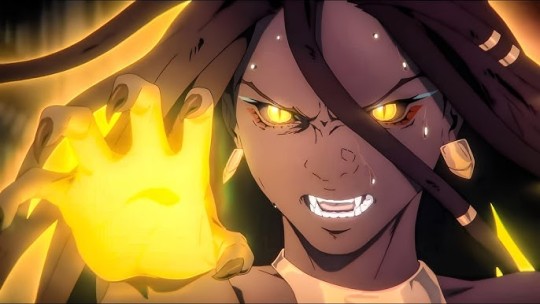
Okay, another little write up that has been requested. (Note, yes, you can send me requests for mythological and historical contexts. I love talking about this stuff. Just send a DM or Ask, and I will see to it when I get time.)
This came from a discussion about Sekhmet in season 2 in Nocturne, where someone brought up: "Well, she cannot really have been a goddess if she died." And of course I had to go: "Well, actually..." At this. It ended with me promising a write up on this.
See, this is an idea that is prevasive in western culture, and gets brought up again and again in media: Gods don't bleed, and gods don't die. It has been brought up in The Road to El Dorado, The Epic Musical, and in Kaos. But this idea is actually mainly rooted in - drum roll please - Christianity of course. With the Christian God being a single god, who is supposed to be all mighty and eternal. Polytheistic cultures meanwhile tend to have a couple of gods who within the mythology die. Sure, some of them are revived by some sort of magic - or continue to exist in another plane (in those cases often becoming the guardians of some sort of plane of the dead, where all dead souls go) - but yes, the polytheistic mythologies that we know off tend to have at least one god who dies.
So, let's talk about some of them.
Ra
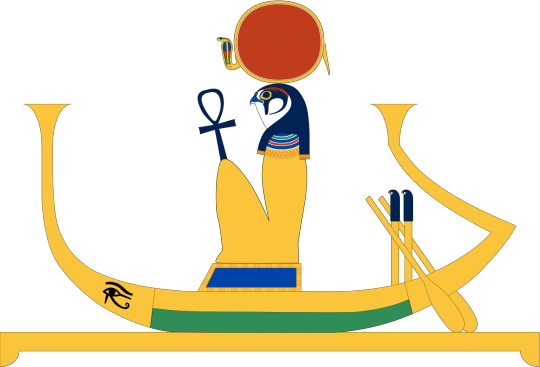
Given our starting point is Sekhmet, let's start with the Egyptian mythology. Here we have two big examples of gods that prominently die.
One example of this is obviously Ra. Ra's entire thing is that he does not only die in the mythology, but that he dies ONCE A DAY, which was the Egyptian mythology's explanation for why there is night and day. Ra dies at the end of the day, and he moved through the duat during the night. This is in fact part of the reason why we know so many details about the duat, as those are described in several mythological texts about Ra's journey through the world of the dead.
Of course, this might be strange example, because Ra obviously gets revived daily, too, but that does not change the fact that he dies once a day. And for a good chunk of Egyptian history (please keep in mind that Egyptian religion shifted during the 3000 years that Ancient Egypt was around) Ra was one of the most powerful gods in their pantheon so to speak.
Osiris
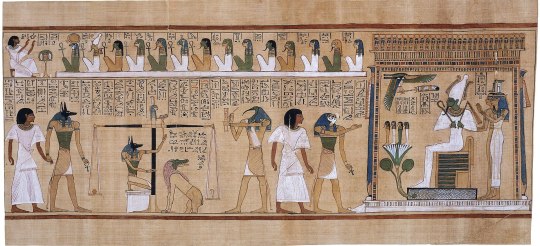
Then Egyptian mythology has probably one of the best known examples of a god getting killed. And that is Osiris. Like almost all of the old mythologies, the Egyptian deities were a lot into siblings marrying. And in Egyptian mythology there were noticable four siblings: Osiris, Isis, Seth and Nephthys - the latter getting usually ignored by modern audiences for some reason.
Osiris married Isis, Seth married Nephthys. And of course, as it goes with godly siblings, Osiris and Seth had a lot of quarelling and rivalry going. Seth - of course - being a god of the desert and chaos. And eventually Seth manages to trap Osiris and kill him. Now, the details of this have shifted once more throughout Egyptian history. In some variations they aphyxiate him, in others Osiris gets hacked into 26 pieces. One way or another, Isis will look for her dead brother-husband, find his corpse or his corpse parts, revive him, get pregnant with Horus, and then they find out that because he was dead he has to become now the god of the dead, being turned into the god overseeing the souls moving into the afterlife.
Baldr
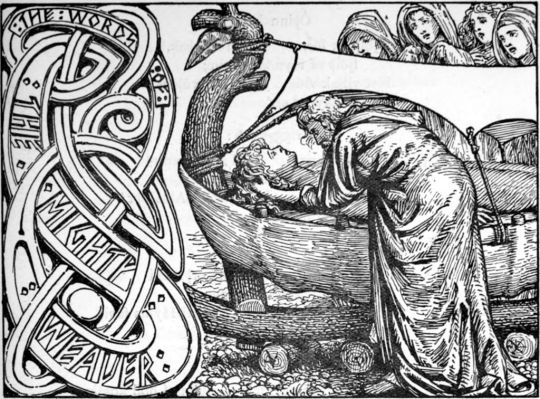
Then there is of course the myth of Baldr in Norse mythology. Another son of Odin and Frigg. And it was said that Baldr was the most beautiful of all the gods. And Frigg loved him so much, that she went around the world and made everything - every stone, every animal and every plant - promise that they would never hurt him. However, she did not get to ask the mistletoe, and Loki noticed this. And being the trickster that he is, he devised a plan. He tricks the blind god Höðr to shoot a mistletoe arrow at Baldr, which then obviously kills him. In the prose Edda this is the reason for Loki's punishment with the acid spitting serpent.
Baldr of course moves onto Hella - the place, not the goddess - and remains there.
It should be noted of course that in the Edda we also know that most of the gods eventually die during Ragnarök. Though this is also where we should note, that the Edda are of course a source that we should use with some care, given that it is not a first hand account by Norse people, but was written up by Christian monks. (Most notable, a lot of researchers doubt by now that Loki ever was an actual god in Norse mythology, but was invented by Christians to fill the roll of a satan-like figure.)
Zagreus
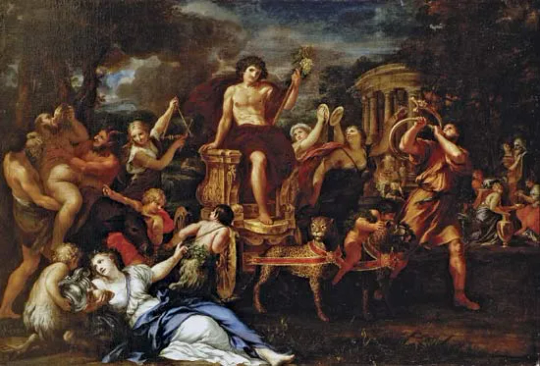
Where are my Hades peeps at? If you have played Hades, you obviously know that Zagreus has this habit of dying and coming back. And this game mechanic is actually based in mythology.
And this is the moment where we should speak about one important fact: We tend to act as if we know everything there is to know about Greek mythology, but actually we do not know this. We know a lot about the most important gods, because we have several written sources about this - but when it comes to smaller or local gods, we absolutely are loosely informed, given we often only have text fragments. At times several text fragments that are contradictory. Zagreus is one of these.
Zagreus is either an alternative name for Dionysus, the son of Zeus and Persephone, or the son of Hades. The latter aspect has been tried to explain by researchers with the fact that we are not sure if the three big gods (Zeus, Poseidon, and Hades) were always distinct entities or might have been for a long while different aspects of the same god.
One way or another: We have at least two different text fragments, in which Zagreus dies. Once he gets murdered by Titans, once he dies in an accident. One way or another he dies. And in the cases where he is a son of Zeus, this seems to be the explanation why he is bound to the Underworld.
The Hades game kinda mixed and matched with the mythology there xD
Lugh
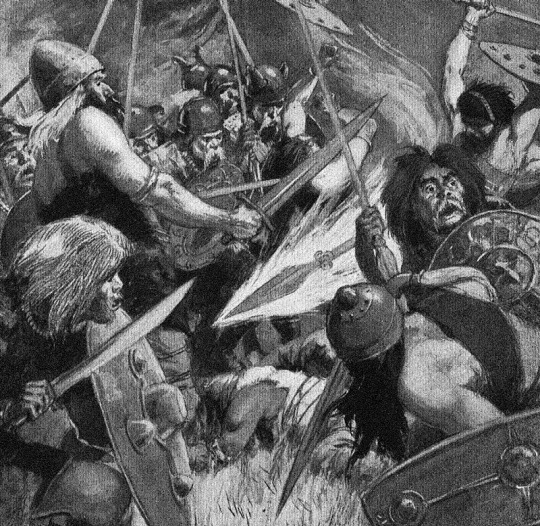
There I go again, talking about another mythology that we are actually not quite as certain about as some people seem to believe we are: Gaelic mythology. Once more, our issue is that while some of this was written down, it was written down after the region had been Christianized, so there is a lot of Christian bias in those texts. In fact it is even more clear in this example, given that the written down accounts of the Gaelic mythology involve references to biblical events. And of course the Tuatha de Danann are in the written down accounts references more as amazing humans, rather than gods - though we are fairly certain they originally were deities, with Lugh in particilar being a god of justice and war.
In the variations of the story we know, Lugh kills another god named Carmait, as that other god had fucked one of Lugh's wives. And in revenge Carmait's sons end up killing Lugh, by spearing him on his own magic spear and then throwing him into one of the Lochs. So, yes, if you count, this story in fact involves two dead gods. Generally speaking, quite a few of the Tuatha de Danann end up dead, though, again, I will point out, that we are not fully sure how much of this is routed in the fact that these myths were recorded by later Christians, who might have wanted to make sure that everyone understands that the Tuatha de Danann were not actually gods.
Izanami
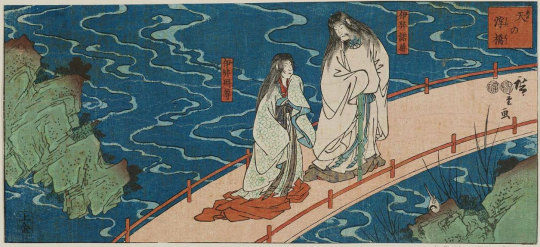
Technically we actually have a variety of Shinto gods (aka kami) who die. But I will focus maybe on the most widely known story, that pretty much everyone who ever played Persona might be aware of: Izanami. And if I recount the tale, you might in fact feel strangely reminded of other myths.
Izanami and Izanagi were the first kami that were created, and they created the land, and then the world around it, through the act of procreation with one another. Eventually Izanami gives birth to the fire god Kagu-tsuchi and he burns her to death. Her remains are buried, but the grief-stricken Izanagi cannot be without her. So he travels to the underworld, Yomi. Eventually he finds Izanami, but she tells him that she can no longer leave the underworld, as she has already eaten from the food of the underworld. He tries to convince her, but eventually he sees her face and realized that she has the face of death, and flees in terror. She gets angry at this, and curses him and the land of the living, before she remains in Yomi as the goddess of the dead.
Vritra
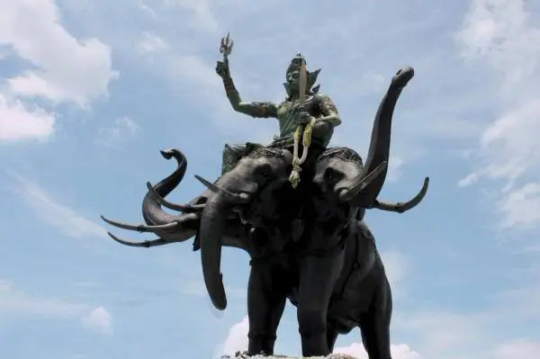
Vritra in Hindu mythology is one of the danava and serves as the personification of drought. In the mythology he once tries to block a river, of course with this causing a drought. The other gods cannot stand by this, and Indra, who sees Vritra as his nemesis, ends up slaying Vritra to stop the drought.
Note, here, too, that there are a couple of deities in Hinduism - as well as the religions that sprung off of Hinduism - that die at least for a shorter while.
If you have ever had the fun of talking to one of the very annoying atheists, you might have heard someone pointing out that Krishna dies and is resurrected in a way that is quite similar to Jesus. Because, yes, this general mythological concept is assumed to probably go back to the progenitor religion of the Indo-European cultures. While we do not know anything about that religion (because back then nobody wrote anything), anthropologists and comparative mythology researchers are fairly sure that there was a tale of a god dying and returning from the dead in that religion as well, which is why it shows up so often in religions of that cultural sphere.
Innana & Dumuzid
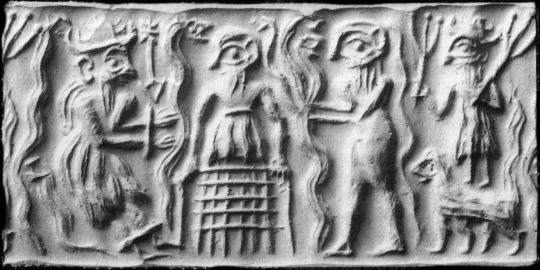
Now let's talk about another really old mythology, about which we know surprisingly much, because they have written a lot down - and we were able to translate it. And that is the ancient Sumerian mythology, in which we have Innana or Ishtar (who in Egyptian mythology later became Isis). Again, due to these also being within the realm of the Indo-European mythologies, you will find some similarities - though in comparison to other goddesses in the same role, Innana is a lot more proactive.
Innana is convinced by her brother to marry the shepard god Dumuzid, though it is fairly clear through the poems we have, that she and her husband never quite saw eye to eye. This makes her death also quite interesting. Because Innana dies by her own volition, because her sister Ereshkigal, who was made the goddess of the dead, misuses her position. So Innana dies to be able to travel to the Underworld and fight Ereshkigal to dethrone her. Enki at this point helps Innana to flee the Underworld and return to the world of the living. However, there needs to be balance in the world. So if she returns to the world of a living, someone else needs to take her place in the Underworld.
As she returns to the world of the living, she sees her servants having mourned her, while her husband, Dumuzid, just instantly went: "I am a widower? Sweet! I can fuck around with servant girls now!" And as we say: Fuck around and find out. So Innana goes: "That asshole has not even the decency to act as if he is mourning me!" So he tells the spirits of the Underworld to take him to take her place. And so they do and kill him.
Good for her!
Quetzacóatl
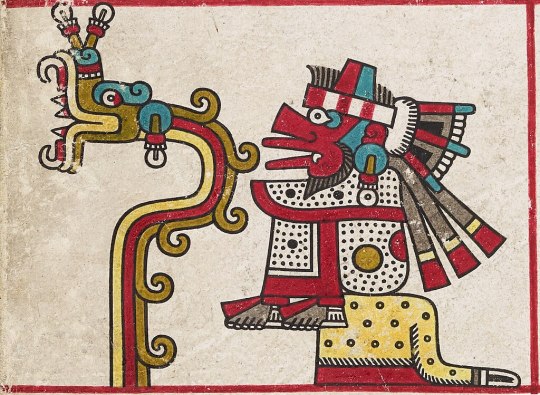
The very attentive of you might have noticed that all myths I have talked about so far (with the exception of Izanami, where anthropologists and comparative mythology people are still arguing about whether or not there was an influence there - mind you, I land very much on the side of "Yes, obviously, there is an Indo-European influence to Shinto-Myth!") are from the Indo-European influence sphere. So let's lastly talk about one other god, who just so happens to be probably important for Castlevania Nocturne as well: Quetzacóatl. Now, historians researching the Nahua, are fairly certain that this myth has come to be because there once was a Nahua ruler named Quetzacóatl after the deity, and that ruler died, which then in mythology got mixed up with the deity. Never the less: There definitely is written down myths about the death of Quetzacoatl.
The short of it is, that a couple of demons plotted to kill him, but knowing that they could not kill a god, they deviced a plan: They would feed him a beer that would drive him mad. While it took a lot of trickery, they succeeded, and drove the god mad, making him commit suicide by burning himself alive.
Maui
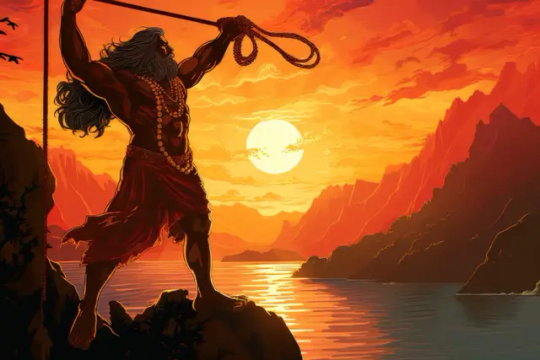
Okay, I know what some might say: "But actually is Maui a god?" I will answer: "That depends who you ask." Maui is a character that shows up throughout almost all the Pacifica cultures. He is always a trickster and a culture hero. At times he is a mortal, at other times he is a demi-god, and at yet other times he is a full god. Because those cultures were distant enough to have the myths shift around. So yes, maybe you will call this cheating. But fuck it, let me talk about Maui, because I kinda think his death is pretty darn cool.
So, if you have watched Moana, you know that Maui is a shape shifter. And he was very fond of humans. So, he decided that he wanted to make humanity immortal. His plan to do so was to go to the goddess of the Underworld and death, Hine-nui-te-pō, and reverse the birth by transforming into a worm and crawl into her vagina. However, she woke, and it turns out that her vagina had teeth - so she crushed him with her vagina teeth. Which is... pretty darn badass, I would say.
Lastly
Let me end this entire thing with the note that there probably are quite a few more gods that die within their respective mythologies. I know at least of two myths from North America in which Coyote dies (a lot of North American cultures have Coyote as a trickster god). And I personally am simply not well informed on South American mythologies or a lot of African mythologies. I do not know stuff about the Indigenous pre-buddhist mythologies of Southeastern Asia, and central Asia. So there is a good chance that there are gods that die - or die and get resurrected in those mythologies - but if there are, I simply do not know enough about them.
Generally speaking though: Gods rarely can be killed by normal mortals. Mortal half-gods might succeed at times. But other gods? Yeah, they sure can kill their fellow deities. And some deities also commit suicide to save other people. It is a common thing throughout mythology.
So, please, can we just stop claiming gods are truly immortal? They will usually not die of old age or anything like that, but they very much can be killed by other gods, magical weapons and such things.
#castlevania#castlevania netflix#castlevania nocturne#mythology#religion#norse mythology#egyptian mythology#greek mythology#japanese mythology#nahual mythology#sekhmet#izanami#celtic mythology#gaelic mythology#lugh#osiris#ra#hades#zagreus
111 notes
·
View notes
Text
DAY 6162
ManHo,MuO Jan 1, 2025 Wed 12:50 am
✨🪔 ,
Happy New Year .. 🎊
January 01 .. birthday greetings to Ef Puneet Jha from Jaipur .. Ef GS .. Ef Bhaskar Ghosh from Dhuburi, Assam .. Ef Santosh Mishra .. Ef Goga Gehad from Egypt 🇪🇬 .. Ef Anand Varma from Nagpur .. Ef Maria CH. from Greece 🇬🇷 .. and Ef Vijay Shah Ef from USA 🇺🇸 .. 🎊💖🙏🏽💐🤗
December 31 .. belated birthday greetings to Ef Madhu Jain .. 🙏🏽❤️🚩
With the blessings of Babuji :
नए वर्ष की शुभ कामनाएँ (Ef) को रह स्वस्थ आप सौ (बसंत) को जीते जाएँ, आशीष और उत्साह आपसे हम पाएँ।
~ Babuji (adapted) 🙏🏻 .. by EF , my gratitude
strange to be printing .. 2025 .. now a companion for the rest of the year each day .. with promise and affection and the love as ever before ..
resolutions say the traditionals .. but to wait for the 1st of the new year to make them and then to execute them .. naaaah ..
why resolve only now .. why the importance of its resolve now on this particular day .. if a resolve needs to be made, it needs to be done then there and NOW, in its immediacy ..
काल करे सो आज कर, आज करे सो अब, पल में प्रलय होएगी, बहुरि करेगो कब
whatever shall be in the coming shall be .. que sera sera .. whatever will be will be .. the future's not ours to see , que sera sera !!
few believe , fewer follow , yet know within that whatever will be will be .. so let it be , let it be ...
and long may the memories of Doris Day and the Beatles be with us , for making through their respective music the reverence of the words and the eternal psychological understanding of the tremors of LIFE ..
and when the time of age diminishes .. the reality of its bearing challenges us , we give the respect it needed, to be observed .. a bit late but never forgotten ..
never forgotten .. never ..
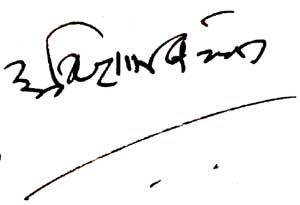
Amitabh Bachchan
121 notes
·
View notes
Text
@vampirejournalist started iwtv fanfic friday and i'm here to participate totally on time and not an hour before saturday begins with some LOUMAND FIC RECS as demanded by my url. here are some bangers.
Bloodletting, explicit, series
Even though we've had our ups and downs.
[“I love you,” Armand whispers. Louis swallows against a painful throat. “Sure, honey,” he says. “I love you.” Like saying it again will make it stick. “I know,” Louis says. Armand whispers it a third time, and Louis closes his eyes so he won’t have to look at him when he says, “I’m not gonna say it back, honey.”]
this is a series and it's number one on the rec list because it's truly The loumand series of all time there is nothing that gets them better. chances are you've read one or two of these but the entire series is absolutely insane. hot and disgusting and vulnerable and heartbreaking and makes me feel crazy.
A Chill That Follows, explicit
He leans down to kiss Armand, cradling the back of his neck in his hand. He smiles when he feels rather than hears Armand sigh against his lips, pleased—as if he’s receiving a gift. It’s almost absurd, to think that he was threatening to kill him less than half an hour ago. “What’s absurd is that threatening to kill you was what finally got you to put out for him,” a dismissive, familiar voice says behind him. Shit.
armand is fighting for his LIFE. delicious read
Triptych (Three Studies for Figures at the Base of a Crucifixion), teen
The five of them— Louis, Armand, the figures at the crucifixion— sit together, far too much alike, deformed creatures with teeth that shine in the dark. They all come apart in pieces.
[Why they bought the Bacon triptych, and why Armand sold it.]
really interesting character study on the trifecta in relation to armand
The Cord That Goes Winding Out The Door, teen
There had never been a time proper in his life where Louis wasn’t surrounded by others, but this was the first time that he had felt permanently connected; eternally un-alone. Another being tied to him, a constant brushing of shoulders against his being.
birthing imagery as horror 😊
1,001 nights, mature
The last time Louis saw the ocean up close was—1998. An island off of Miami. Flat, breezeless night.
Or: shards of the past seventy-seven years.
loumand failmarriage through the decades.
dirges, explicit
They fell into a holding pattern for a while in the seventies, in the years before Daniel. Perhaps it was not so long as years, but time dilated, as it was, in Armand’s experience, sometimes wont to do, and it stretched into a small eternity, syrupy and neon-lit, of Louis throwing himself onto swords, chasing and chasing, Armand trailing after with the end of the leash.
practically a loumand heritage fic. written pre s2 but managed to predict so many key parts of their dynamic.
Alexandria, explicit
Louis, glitteringly modern as Armand has always found him, is an excellent tourist, throwing himself into the wholehearted pursuit of the city with an almost manic zeal. Thunderingly alive in Paris, thunderingly alive in Alexandria, thunderingly alive for the rest of their lives, wherever they might be.
loumand in egypt! almost feels like a slice of life in a way, reading this makes you feel like this is really how they spent those 77 years together. the perfect undercurrent of tragedy and bitterness and, of course, love.
acts of collision, explicit
Armand misses Louis like a man about town misses his favourite whore. He misses what only one person is horrid enough to do to him. And Daniel wouldn't even suggest it, if he couldn't feel how Louis misses Armand in the exact same way.
this one is sort of cheating because its a loumandiel fic from daniel's pov, but it's so so good. set in a nebulous post s2 future where daniel invites louis to do a bdsm scene with armand because they both miss each other but armand quite literally Doesn't Talk to louis the whole time. rlly fascinating
the crowning evil, explicit
Armand stood, back to the window, unblinking, tension carrying itself in his frame. Liar, Louis thought. All he could think. Centuries old monster playing at being a boy. A boy pretending to be a man. Unworthy in both roles. Something akin to revulsion clawed up his throat, but it couldn't be, not really, he was too burnt to a husk to muster it in its completeness.
“Come here,” Louis said, his voice dropping.
Armand stepped forward, eyes going wide and hopeful and hungry in half a second. “Yes, Maître.”
“You’re still on that?” Louis asked.
this is just self promo im ngl 💗 but i'm confident enough that my own fic is good so. loumand having despair sex before going to meet lestat in paris in 2.08
this ended up being pretty long but loumand writers when they get it right write such beautiful fics 💗 thank you wonderful iwtc writers. happy fanfic friday/saturday!
146 notes
·
View notes
Text
Eternal Bonds: A Love Across Time {OP81}
Navigation
Summary: Every soul carries a unique mark—a tether invisible to the eye yet undeniable to the heart. Some call it destiny, others call it a cruel game played by time. For Y/N and Oscar, their connection defied the natural order, binding them across centuries. Each life they lived told a tale of love and loss, as if the universe itself conspired to keep them apart—until the present day, when their stories converged to finally bring closure to their enduring bond.
WC: 4.7k
Taglist
• you DO NOT have my permission to copy my work, upload as your own, translate, or repost on any other website •

---The Desert Sands of Ancient Egypt
The sun blazed over Thebes, casting a golden hue over the Nile’s waters. Y/N, a skilled healer in service to Queen Nefertari, was known across the land for her unparalleled knowledge of herbs and remedies. Her beauty was equally renowned: her dark, coiled hair was adorned with gold beads that shimmered in the sunlight, and her rich, deep skin seemed to reflect the Nile’s brilliance. Her sharp mind and unwavering confidence made her a trusted confidant of the queen.
One fateful day, Y/N was summoned to the palace to tend to a group of foreign warriors who had arrived as part of a diplomatic delegation. Among them was Oscar, a strikingly handsome emissary with piercing hazel eyes that seemed to hold the secrets of faraway lands. As Y/N wrapped a bandage around his wounded arm, she felt an inexplicable pull, as though she had known him before.
Their conversations began with formal pleasantries, but soon evolved into deep exchanges about their homelands, their dreams, and the stars above. Oscar spoke of his people’s customs and the distant mountains he longed to show her. Y/N, in turn, shared tales of her childhood by the Nile, her ambitions to bring healing to those in need, and her admiration for the queen’s wisdom.
The more they spoke, the more their connection deepened. But their love was fraught with obstacles. Y/N’s position as the queen’s healer demanded loyalty and discretion, while Oscar’s role as an emissary placed him under constant scrutiny. Still, they found ways to steal moments together, meeting in the cool shadows of the temple or under the cover of night by the riverbank.
One evening, under a canopy of stars, Oscar took Y/N’s hand. “If fate were kinder, I would stay here with you forever,” he said, his voice thick with emotion.
Y/N’s eyes glistened with unshed tears. “And if the gods would grant me one wish, it would be to follow you to the ends of the earth.”
Their clandestine meetings did not go unnoticed for long. A jealous courtier, seeking to curry favor with the queen, reported their forbidden bond. Summoned before Queen Nefertari, Y/N was confronted with a terrible choice: renounce her love for Oscar or face banishment from the palace.
Before Y/N could answer, guards seized Oscar, accusing him of attempting to undermine the queen’s court. Despite Y/N’s pleas, the queen was resolute. “His presence here threatens the delicate balance of diplomacy. He must face the consequences.”
Oscar was sentenced to death. On the night of his execution, Y/N fought her way to the prison, her cries echoing through the stone corridors. She reached him moments before the guards led him away.
“I will find you again,” she whispered, clutching his hand through the iron bars.
“In every lifetime,” Oscar replied, his voice steady despite the doom that awaited him.
Y/N’s screams pierced the air as the blade fell, her heart shattering into a thousand pieces. Alone in the silent aftermath, she vowed to the gods that their love would not end here. Somewhere, sometime, they would be together again.
--- The Gardens of Renaissance Florence
Centuries passed before Y/N’s eyes fluttered open to the golden light of Florence, Italy. It was the age of the Renaissance, a time of rebirth, when art, science, and humanism flourished in gilded splendor. Y/N, now a gifted apprentice in a renowned atelier, found her days filled with the scent of linseed oil and the vibrant colors of crushed pigments. Her fingers danced across canvases, bringing life to the faces of Florence’s elite, including the illustrious Medici family, patrons of the arts and wielders of great power.
Her skin, kissed by the Tuscan sun, was a rarity in these parts, an enigma that both inspired and unsettled. Though whispers followed her, her talent proved undeniable. Her frescoes adorned chapel walls, and her portraits captured souls in ways others could not.
One fateful evening, Y/N attended a gala hosted at the Medici Palazzo, a shimmering bastion of wealth and influence. Draped in a gown of deep emerald, she moved through the gilded halls, her presence a quiet defiance to those who doubted her place. There, beneath the glimmer of Venetian chandeliers, she encountered a man whose presence struck her like a bolt of lightning.
Oscar, now a charismatic inventor, stood surrounded by curious onlookers, his hands gesturing animatedly as he described his latest mechanical contraption. His features, softened by time but sharpened by experience, were strikingly familiar. When their eyes met, it was as though the air had been sucked from the room. Neither could explain the overwhelming pull between them, the ghost of a memory just out of reach.
Their connection deepened quickly. Both driven by an insatiable hunger for creation, they spent hours in the Medici gardens, sketching designs for Oscar’s flying machines or perfecting Y/N’s portraits. Their late-night conversations, carried by the scent of orange blossoms and the rustle of cypress trees, drifted toward whispered secrets and dreams of a world where they might truly belong.
Yet Florence, with all its beauty, held a darkness. The rigid social hierarchies were unforgiving, and Y/N, as a Black woman in this world, bore the brunt of its cruelty. The Medici patriarch, Lorenzo il Magnifico himself, grew suspicious of her influence over Oscar, whose inventions were beginning to garner both praise and envy. “Your liaison threatens our house,” Lorenzo warned one evening, his voice as cold as the marble statues that adorned the palazzo. “She is a distraction—a danger to everything we have built.”
The lovers tried to navigate the rising tensions, but their bond, as fiery as it was forbidden, became impossible to hide. When whispers turned to outright scandal, the Medici family’s ire boiled over. An ultimatum was delivered: Y/N must leave Florence, or Oscar would face dire consequences.
The decision was made. On a moonlit night, with shadows cloaking their movements, Y/N and Oscar prepared to flee to Venice, a city where they believed they might find refuge among its labyrinthine canals and the anonymity of the Serenissima. Their modest carriage, laden with only the essentials, creaked as it made its way out of the city, the sound blending with the soft trill of nocturnal birds.
But Florence’s grip proved relentless. Just beyond the city’s gates, as their carriage descended into a wooded ravine, the clatter of hoofbeats shattered the stillness. A group of masked men, sent by the Medici, emerged from the shadows, swords drawn. The ambush was swift and brutal.
Oscar leaped to defend Y/N, using his cane as a makeshift weapon, but they were outnumbered. Y/N, with the same fierce determination that fueled her art, grabbed a dagger concealed in her belongings and fought alongside him. Amid the chaos, one of the attackers lunged toward Oscar, his blade aimed for his chest.
“NO!” Y/N’s scream tore through the night as she thrust herself between them, the steel sinking into her flesh. Time seemed to freeze as she fell into Oscar’s arms, her blood staining his hands as red as the poppies that bloomed in the fields they had once dreamed of escaping to.
“Y/N, stay with me,” Oscar pleaded, his voice cracking. “Please, stay.”
Her breaths came in ragged gasps, her eyes searching his. “Oscar,” she whispered, her voice barely audible above the rustling leaves. “Do not let this end us. Promise me you will create a world where love like ours is no longer a crime.”
Tears streamed down his face as he clutched her, the warmth of her life slipping away. The attackers, seeing their task complete, melted back into the shadows, leaving Oscar alone with his grief.
As the first rays of dawn painted the sky, Oscar buried his face in Y/N’s hair, his soul fractured. Her words echoed in his mind—a plea for a future he vowed to realize.
In the days that followed, whispers of Y/N’s death spread through Florence. To those who had known her only as an artist, her loss was merely a passing tragedy. But to Oscar, it was the loss of a part of himself, a wound that no time or invention could ever mend. Her memory became his muse, her sacrifice the fuel for his creations, each one imbued with the hope that love could transcend even the cruelest barriers.
And though the Medici gardens bloomed with the beauty of the Renaissance, for Oscar, they would forever bear the shadow of the night he lost her—the woman who had been the light of his life.
-- The Battlefields of World War I
The year was 1917, and Europe was engulfed in the Great War. The Western Front stretched like a festering wound across the continent, a no-man’s land of mud, barbed wire, and death. The air carried the acrid stench of gunpowder and the low, ceaseless rumble of artillery fire. Against this grim backdrop, Y/N worked as a nurse with the Voluntary Aid Detachment, tending to the unending tide of broken men sent back from the front lines.
Her hands, though steady and skilled, were perpetually stained with blood. Day and night, she moved between cots in the crowded field hospital, her soft voice a balm to the suffering and her touch a small mercy in a world gone mad. She was a woman of extraordinary resilience, her presence in the midst of chaos a testament to the enduring human spirit. Yet the horrors she witnessed weighed heavily on her, seeping into her dreams and stealing moments of quiet.
One cold, rain-soaked afternoon, as Y/N wrapped a fresh bandage around a soldier’s mangled arm, the doors of the hospital swung open. A stretcher was hurriedly carried in, the figure upon it groaning softly. The soldier was young, his face pale beneath the dirt and streaks of dried blood. His left arm hung at an awkward angle, and shrapnel wounds marred his chest. The tag pinned to his uniform read: Lieutenant Oscar Piastri, Australian Flying Corps.
Y/N felt an unexplainable jolt as her eyes met his for the first time. Though his features were unfamiliar, something about him stirred a memory buried deep within her soul. She shook off the sensation and focused on her task, instructing the orderlies to prepare a clean cot for the new patient.
Oscar was delirious with pain as she worked to clean his wounds, but even through the haze, he managed a faint smile. “An angel, come to save me,” he murmured, his accent thick with the drawl of the Australian outback.
Y/N couldn’t help but chuckle softly, despite the grim circumstances. “Hardly an angel, Lieutenant,” she replied, her voice firm yet kind. “Just a nurse doing her duty.”
Over the weeks that followed, as Oscar’s injuries slowly healed, he became a fixture in the ward. Unlike many of the soldiers, whose spirits were crushed by the horrors they had endured, Oscar exuded a disarming optimism. He joked with the other patients, shared stories of his childhood in Australia, and helped boost the morale of the weary nurses.
For Y/N, his presence became a source of unexpected solace. Though she maintained a professional demeanor, she found herself lingering at his bedside after her rounds were complete, drawn in by his charm and wit. They spoke of everything—his dreams of flying after the war, her aspirations to study medicine, and the lives they had left behind. Each conversation felt like a reprieve from the darkness of the world around them.
One evening, as the sound of distant shelling reverberated through the camp, Oscar confided in her. “It’s strange,” he said, staring at the ceiling of the canvas tent. “I’ve seen death more times than I can count. But meeting you feels like a second chance at life.”
Y/N, taken aback by his candor, looked away, her hands fidgeting with the hem of her apron. “This war takes so much from us,” she whispered. “I suppose it’s only natural to cling to whatever light we can find.”
Their bond deepened with each passing day. In stolen moments, when the ward was quiet, they walked together outside the hospital, breathing in the crisp air and finding comfort in each other’s presence. They laughed, shared dreams, and even dared to imagine a future beyond the war.
But the war was relentless, and its shadow loomed over them. As Oscar regained his strength, he was cleared to return to active duty. The news came as a blow to Y/N, though she tried to hide her despair. “You’re needed here,” she said softly one evening as they sat on a low wall overlooking the makeshift hospital.
Oscar placed a hand over hers, his gaze steady. “And you’re needed here too,” he replied. “But we have to do what’s right, Y/N. I have to go back up there. For my mates. For all of us.”
Their goodbye was bittersweet. Y/N gave him a small pendant, a simple token she had carried with her for years. “For luck,” she said, her voice trembling. “Promise me you’ll come back.”
“I promise,” he said, pressing the pendant to his lips before tucking it into his jacket. “No matter what happens, I’ll find you again.”
For weeks, life at the hospital continued as usual, though Y/N’s heart ached with worry. Letters from Oscar arrived sporadically, each one a lifeline in the midst of the unrelenting chaos. He described the thrill of flying, the camaraderie among his squadron, and his longing to see her again.
Then, one fateful day, the news came. A bombing raid had gone disastrously wrong. Oscar’s squadron had been ambushed by enemy fighters, and his plane had been shot down behind enemy lines. The official report listed him as missing, presumed dead.
The words hit Y/N like a physical blow. She staggered, her knees buckling as she clutched the telegram. Her mind refused to accept the reality, clinging to the hope that perhaps, somehow, he had survived. But days turned into weeks, and no further news arrived.
Y/N threw herself into her work with a ferocity that bordered on desperation. She tended to the wounded with unwavering dedication, but her laughter was gone, replaced by a quiet grief that weighed heavily on her shoulders. At night, when the ward fell silent, she sat alone beneath the stars, clutching the small pendant she had given Oscar, now returned to her among his personal effects.
“Once again, fate has stolen you from me,” she murmured to the void, her tears falling freely. “But I will find you, Oscar. In this life or the next, I will find you.”
The war raged on, but for Y/N, the battle had become deeply personal. The love she had found amidst the carnage had been snatched away, leaving her with only memories and the unshakable conviction that their souls were destined to reunite.
-- 1980's Mafia Battles
The neon lights of the city flickered against the thick fog of cigarette smoke that hung in the dimly lit streets. New York, in the 1980s, was a landscape painted in shadows and chaos, where power was bought and sold on every corner. Beneath the glittering skyline, the streets thrummed with danger, alive with the silent wars of the Five Families—the Gambinos, Genovese, Luccheses, Bonanno, and Colombos. It was a world of whispered betrayals, blood-stained deals, and shifting alliances. The city wasn’t merely a backdrop; it was a battlefield, where power was currency and loyalty was fleeting.
The city pulsed with a heartbeat that echoed in the alleyways and the boardrooms, where the mafia families of the city ruled with a quiet, deadly force. Oscar Piastri had learned early in life that love was a commodity that could be bartered for power—or destroyed when it was inconvenient.
Oscar Piastri was born into this crucible, a scion of the Gambino family and nephew to the infamous John Gotti, the "Dapper Don." Gotti’s rise to power had reshaped the family, bringing both prosperity and chaos. As his protégé, Oscar was groomed for greatness, expected to embody the ruthless cunning that defined their legacy. From a young age, Oscar had learned the rules of survival: be ruthless, be calculating, and above all, trust no one. Yet, for all his uncle’s lessons, nothing could prepare him for the storm that would upend his carefully ordered life.
She was that storm: Y/N, a woman of elegance and enigma, a deadly agent of the Genovese family. Her name carried weight in whispers, a shadow within shadows. The Genovese were known for their subtlety, their long games of manipulation, and Y/N was no exception. Her dark eyes held secrets, her presence commanded respect, and her beauty was a weapon as sharp as any blade. The tensions between their families simmered just below the surface, but it was her arrival that would ignite an inferno.
The Silver Dagger was a sanctuary of sin. A nightclub where the walls had ears, but the patrons didn’t care. Under the glow of neon lights, it was a place where alliances were forged and broken, where power whispered promises under the cover of music and laughter. That night, Oscar stood at the bar, his drink in hand, his mind elsewhere. Until he saw her.
Y/N was magnetic, her presence drawing every eye in the room, but it was Oscar’s gaze that lingered. Her confidence was unshakable, her every step deliberate. She moved through the crowd as if she owned it, and perhaps she did. When their eyes met, the air seemed to crackle, the world narrowing to just the two of them.
He knew who she was. He’d heard the stories, the warnings. Yet, he couldn’t look away. And when she approached him, it was as though fate had taken control.
“Oscar Piastri,” she said, her voice a blend of silk and steel. “The Golden Boy of the Gambino family. I’ve heard a lot about you.”
He raised his glass, his smirk masking the storm inside. “And you must be Y/N. The Genovese family’s finest. Should I be flattered, or concerned?”
Her lips curved into a dangerous smile. “A little of both, perhaps.”
Their words were a dance, a sparring match veiled in civility. Each knew the stakes; each felt the pull. The world around them blurred, the music and chatter fading into the background. This was no ordinary meeting. It was the beginning of something neither could escape.
For weeks, they met in secret. Abandoned warehouses, dimly lit corners of neutral territories, stolen moments in a world that would destroy them if it knew. Their connection was electric, a forbidden bond that defied logic and loyalty. Yet, as their love grew, so did the danger.
It was a betrayal from within that shattered their fragile world. A mole in the Gambino ranks leaked their secret to the Genovese family, and Vincent “Chin” Gigante seized the opportunity. For the Genovese, it was a chance to assert dominance; for John Gotti and Carlo Piastri, it was an unforgivable insult. The stage was set for a reckoning.
Oscar and Y/N’s final meeting was under a blood-red sky, the city bracing for the storm to come. They knew what awaited them, yet they clung to hope, however fleeting.
“This isn’t the end,” Y/N whispered, her voice trembling but resolute. “Promise me, Oscar. Promise you’ll find me.”
His hand tightened around hers, his heart breaking. “I promise. In every lifetime, I’ll find you.”
The ambush came swiftly, a symphony of violence orchestrated with ruthless precision. Y/N was lured to a meeting with promises of a truce, but it was a lie—a trap designed to send a message. The Genovese hit squad surrounded her in a desolate warehouse, their guns raised, their faces cold and unforgiving. She fought like a lioness, her skill and determination unmatched, taking down three of her attackers before a shot struck her shoulder, then her leg. She fell to her knees, her breath ragged, yet her eyes burned with defiance.
When Oscar arrived, the scene was chaos. Bodies littered the floor, blood pooling beneath them. And then he saw her. Y/N lay against a shattered crate, her once-bright eyes dimming, her breaths shallow. He rushed to her side, his hands trembling as he cradled her broken form.
“Oscar...” she gasped, her voice barely a whisper. Her blood-stained hand reached for his face, her touch feather-light. “Don’t... don’t let them win.”
Tears streamed down his face as he held her close. “I’m so sorry. I’ll make this right, I swear.”
A faint smile touched her lips, bittersweet and fleeting. “Find me. No matter how long it takes.”
Her hand fell away, her body going still. Oscar’s anguished cry echoed through the empty warehouse, a sound of heartbreak and fury that could silence even the most hardened soul.
In the days that followed, Oscar became a ghost of himself. His love had been ripped away, his world shattered. John Gotti’s fury was unrelenting; vengeance became the family’s rallying cry. But for Oscar, the fire of revenge was tempered by a deeper promise. The vow he made burned within him, a beacon in the void. Their love had defied the odds, and he knew, with every fiber of his being, that it wasn’t the end.
“I will find you,” he swore, staring into the city’s endless horizon. “No matter how many lifetimes it takes.”
And so, Oscar Piastri began his journey, a man burdened by fate, driven by love, and haunted by the ghost of Y/N. The world may have torn them apart, but he would defy it again and again, until they found their way back to each other.
-- Present Day
Y/N stood on the balcony of her sleek apartment in London, the city skyline sprawling before her. The shimmering lights of the city danced on the surface of the Thames, casting a soft glow that mirrored her contemplative mood. As an accomplished sports journalist, Y/N had spent years chasing stories that brought the adrenaline of the racetrack to life for millions of readers. Her life was a whirlwind of high-stakes interviews, international travel, and deadline pressures. Yet tonight, the quiet hum of the city brought an unexpected stillness. She swirled a glass of wine in her hand, her mind drifting to the unshakable feeling that something was missing, though she couldn’t quite define what it was.
Meanwhile, across the city, Oscar Piastri was stepping out of McLaren’s state-of-the-art headquarters, the faint scent of rubber and motor oil lingering in the cool night air. His rookie season with McLaren alongside Lando Norris had been a rollercoaster of triumphs and challenges, and every day was a testament to the grueling yet exhilarating nature of Formula 1. He loved the sport—the speed, the precision, the electrifying rush of crossing the finish line. But even amid the chaos of his dream career, a quiet void gnawed at him, as though something vital was just out of reach.
Their paths crossed on a crisp autumn evening at a charity gala hosted by McLaren. Y/N had been invited to cover the event, her editor insisting on a feature that would capture the human side of the racing world. She arrived dressed in an elegant black gown, her professional demeanor cloaking the nervous excitement she always felt before mingling with the elite. The room buzzed with energy, the air heavy with the mingling scents of champagne and expensive cologne.
Oscar had reluctantly agreed to attend, his team’s PR insisting it was good for his image. He stood near the bar, nursing a sparkling water, his sharp tuxedo doing little to mask the restless energy that came from being off the track. He scanned the crowd absently until his gaze landed on Y/N. Something about her—the confident way she moved, the glimmer of determination in her eyes—drew his attention. It wasn’t just her beauty; it was the inexplicable pull, as though he’d known her forever.
“Excuse me, are you Y/N Y/L/N?” he asked, his Australian accent warm and unmistakable as he approached her. She turned, startled by the familiarity in his tone, her eyes meeting his. For a moment, the world seemed to still.
“Yes, I am. And you’re… Oscar Piastri?” she replied, her voice steady despite the sudden flutter in her chest.
He offered a charming grin. “Guilty as charged. I’ve read some of your work. You’re quite good at what you do.”
“Thank you,” she said, a smile tugging at her lips. “I’ve been following your season. You’re quite the rising star.”
“I’ve had a lot of help,” he admitted with a modest shrug. “But enough about me. What’s it like covering the madness of motorsport?”
Their conversation flowed effortlessly, like two old friends catching up after years apart. They talked about the pressures of their careers, the sacrifices, and the shared love for the thrill of racing. By the end of the night, they had exchanged numbers, the connection between them undeniable.
What began as polite texts turned into late-night phone calls. Y/N found herself looking forward to their conversations, drawn to the sincerity beneath Oscar’s confident exterior. Oscar, in turn, was captivated by Y/N’s sharp wit and unshakable determination. They began meeting up during race weekends, the line between professional and personal blurring with each passing day.
But with their growing closeness came something else—strange and vivid dreams. Y/N began waking in the middle of the night, her heart racing from visions of sun-drenched deserts, the scent of ancient temples filling her senses. Oscar, too, found himself haunted by fleeting images of Florence’s cobblestone streets and the metallic tang of war. At first, they didn’t speak about it, each afraid of sounding ridiculous. But the memories became impossible to ignore.
One evening, as they sat together on the balcony of Y/N’s apartment, the setting sun casting a golden glow over the Thames, Y/N finally broke the silence.
“Oscar, have you ever had dreams that feel… too real to be dreams?” she asked hesitantly, her gaze fixed on the horizon.
His hand found hers, his touch grounding her. “I have. They’re about us, aren’t they?”
She turned to him, tears pooling in her eyes. “Yes. It’s like we’ve lived a thousand lives together. And I’m just now remembering.”
As they spoke, fragments of their shared past began to surface. They remembered the deserts of Egypt, where they were torn apart by war. They spoke of the gardens of Florence, where stolen moments of bliss had ended in heartbreak. They relived the trenches, the despair of separation, and the hope that somehow, they’d find each other again. Each memory collided with the present, overwhelming yet bringing clarity.
Through tears and laughter, they pieced together their history, their voices trembling with emotion. “This time,” Oscar vowed, his voice thick with resolve, “I’m not letting anything come between us.”
Y/N leaned into him, her heart swelling with a love that spanned millennia. “We’ve been through so much. Maybe now, finally, we can have our forever.”
As the last rays of sunlight faded, Y/N turned to Oscar, her voice barely above a whisper. “But what if we lose it again?”
Oscar’s eyes searched hers, filled with a bittersweet ache. He cupped her face gently, his thumb brushing away a stray tear. “Even if we do, we’ll find each other again. We always do.”
The words hung in the air, heavy with the weight of their shared past. Slowly, he leaned in, and their lips met in a kiss that felt both like a beginning and an ending—a tender, desperate promise to fight for the love that had been tested time and time again. It was a kiss filled with the sorrow of their losses, the hope of their reunion, and the unshakable truth that their souls were forever intertwined.
When they finally pulled apart, the night seemed quieter, the city lights softer. Y/N rested her forehead against his, her tears mingling with a bittersweet smile. “Maybe this time, we can finally get it right.”
Oscar nodded, his voice steady but tinged with emotion. “We will. One lifetime at a time.”
As the moon rose high above the Thames, the universe seemed to exhale, watching as these two souls, bound by an unbreakable bond, stood on the precipice of a love that had transcended lifetimes. And for the first time in countless reincarnations, they chose to face the uncertain future together, their hearts full of hope and the bittersweet knowledge of what they had endured to get here.

OP81 Taglist: @tallrock35, @yourbane, @evie-119, @ilivbullyingjeongin, @ggaslyp1, @cmleitora, @d3kstar, @fadingcloudballoon-blog, @hinamesgigantica, @01rrdbull, @anamiad00msday
F1 Taglist: @tallrock35, @yourbane, @hiireadstuff, @really-fucking-tired, @evie-119, @donteventry-itdude, @spookystitchery, @dhanihamidi, @decafmickey, @cmleitora, @d3kstar, @mellowluka, @omgsuperstarg, @qxeenjen, @same1995, @hinamesgigantica, @fadingcloudballoon-blog, @laptime-deleted, @anamiad00msday
#formula 1#x black fem reader#x black!fem!reader#x reader#x black!reader#x black reader#formula one#f1#op81 fic#op81#op81 mcl#op81 x reader#op81 imagine#oscar piastri#mclaren#oscar piastri x you#oscar piastri fanfic#oscar piastri imagine#oscar piastri x black!reader#f1 x black!reader#formula one x black reader#formula one x reader#formula one x you#formula one x y/n#formula one x oc#formula 1 x female reader#formula 1 x reader#formula 1 x you#formula 1 x y/n#formula 1 x oc
66 notes
·
View notes
Text
More Ancient Egyptian Art Vocabulary

for your next poem/story
Double crown - the crowns of Upper and Lower Egypt worn together
Dynasty - a series of rulers descending within a family; following the Ptolemaic historian Manetho, ancient Egyptian history is divided into thirty dynasties
Faience - a powdered quartz paste, which is modeled or molded and fired; it is either self-glazed or made with applied glaze
False door - a panel in the form of a niched doorway through which the deceased could receive offerings
Gesso - a mixture of whiting and glue often used to prepare a surface for painting
Harakhty - “Horus of the horizon,” the god of the rising sun, depicted as a falcon or a falcon-headed human crowned by a sun disk
Hathor - a goddess sometimes depicted as a cow or with cow’s horns and ears; associated with joy, music, and love
Heh - god of millions of years, of eternity
Hieratic - handwritten counterpart to the hieroglyphic script, developed in the Old Kingdom mainly for writing on papyrus; written from right to left
Hieroglyph - a Greek word meaning “sacred symbol.” In Egypt, one of some seven hundred signs used in writing (considerably more if one counts signs used exclusively in the Old Kingdom and the periods after the New Kingdom). “Hieroglyphs” refers to the signs themselves; “hieroglyphic script” is Egyptian writing. (Calling the signs “hieroglyphics” is incorrect.)
Horus - ancient sky god in the form of a falcon, embodiment of the divine powers of the living king; son of Osiris and Isis
Ideogram - (sense sign) a hieroglyph signifying the actual object depicted or a closely connected notion
Isis - wife of Osiris, mother of Horus, the divine magician because of her extraordinary powers, divine mourner of the dead; her name is written with the hieroglyphic sign for “throne,” which she wears on her headdress
Ka - life force; the hieroglyphic sign is a pair of extended arms
Maat - right order and justice established by the gods, personified by the goddess Maat, who wears an ostrich feather on her head or is represented by the ostrich feather itself
Magic rod - a squared or rectangular object carved with symbols, such as felines, crocodiles, protective wedjat eyes, and baboons tending lamps, that Egyptians may have believed helped the sun reappear each day from the chaos of night. These rods were placed in tombs to guarantee a similar rebirth to the deceased.
Mastaba - a type of Egyptian tomb having a rectangular superstructure with exterior walls slightly slanting inward as they rise; contains chapels, chambers, and a shaft leading to an underground burial
Mortuary temple - a temple erected and endowed by a king where he could receive offerings in perpetuity after his death
Mut - “mother”: worshiped as the consort of Amun; shown as a vulture or as a woman wearing the double crown
Myrrh - a fragrant aromatic plant gum used in making perfume, unguents, and incense
Source ⚜ More: Word Lists
#ancient egypt#art#terminology#word list#writeblr#writing inspiration#spilled ink#writing reference#dark academia#creative writing#light academia#literature#writers on tumblr#poets on tumblr#writing prompt#poetry#writing resources
93 notes
·
View notes
Text
Respect Neo-Pagans and Our Gods!
Although they probably will never see it (or care), this post is meant for Hollywood, Netflix, Marvel and all other industries and streaming platforms that are hosting shows based on but twisting pagan or polytheist "mythology" or ancient religions such as Gods of Egypt, Immortals, Clash of the Titans, Thor: Love and Thunder, DT17, Supernatural, Kaos, Twilight of the Gods, Blood of Zeus, Percy Jackson, Xena: Warrior Princess, The Chilling Adventures of Sabrina, Record of Ragnarok, American Gods, Lore Olympus, and God of War games, etc.
The trend of creating content that demonizes, humiliates, or insults our Gods is upsetting and unfair. Creative and artistic license is one thing, but it's a double-standard for content about the monotheistic god or religions to be treated with respect even when under academic criticism while are ours are depicted as one-dimensional, villainized and humiliated. We are asking for that same respect.
Yes, content about any kind of "mythology" is fun, but the modern world needs to please remember that these were and still are RELIGIONS to many people around the world, myself included.
People worshipped these Gods, listened to their stories around the fire, married under their vows, raised their children, went to war, and but also built magnificent structures, wrote literature, prayed in their temples, and many more!
In fact, we still have vestiges of their worship! The names of the months and days of the week in the Western world come from Roman or Norse/Germanic Gods, the Olympic Games were originally dedicated to Zeus, the Hippocratic Oath was originally a prayer offered to Apollo, people from all over the ancient world visited the shrine and oracle at Apollo's Delphi, and many more examples.
And while yes, sometimes people were sacrificed to some pagan Gods (not so much the Greeks or Romans), but are we really going to pretend that many more people haven't died in the name of Christianity or Islam??
Lord Zeus wasn't just some womanizer, he was also King of the Gods, Father of Gods and Humans, the God of Hospitality, Oaths, Lightning, Law, Order, Authority, Monarchy, etc.
This was also Lord Zeus of the ancient Greeks:
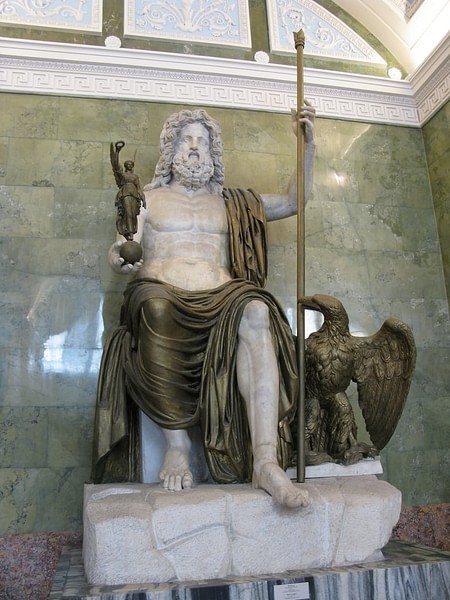
This was also Lord Odin of the ancient Norse:
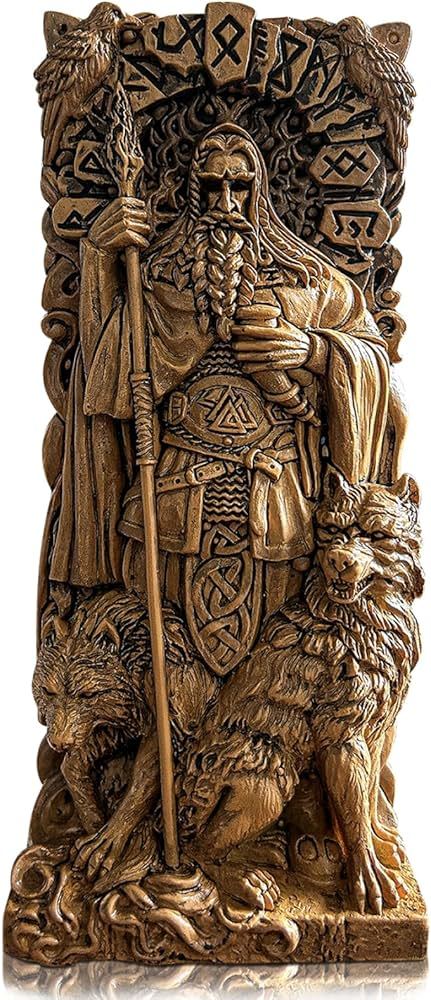
This was also Lady Hera of the ancient Greeks:
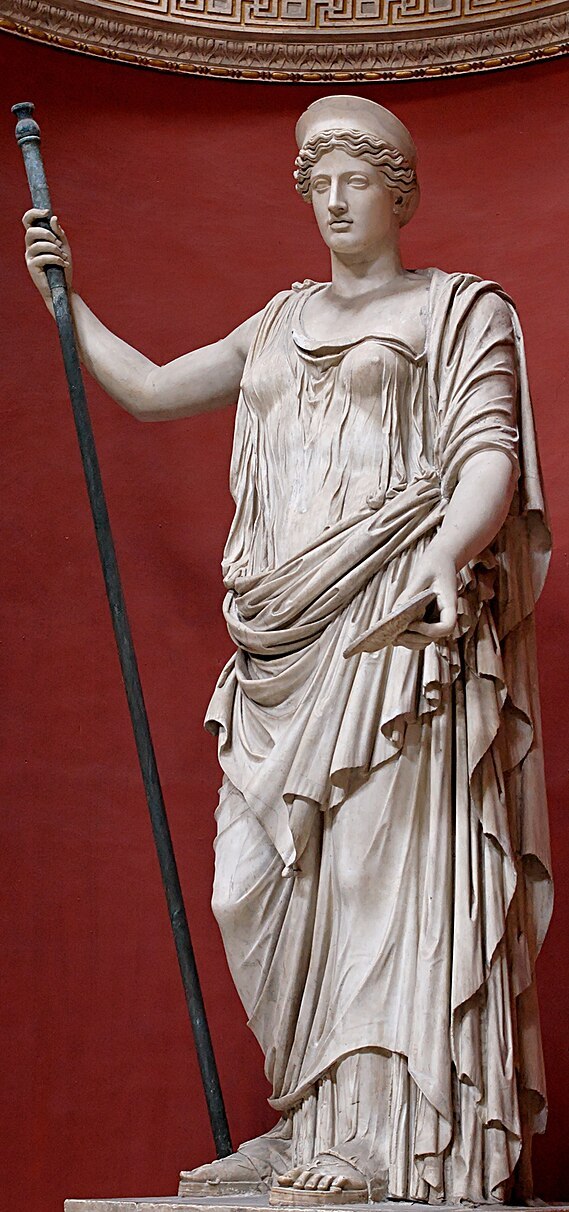
This was also Lord Ra of the ancient Egyptians:
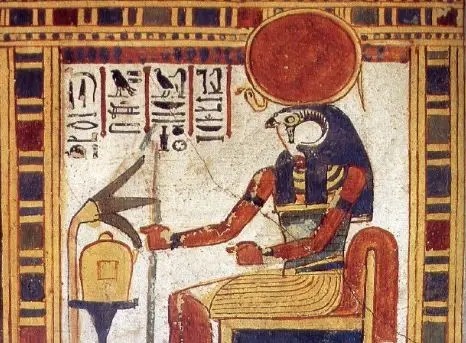
This was also Lord Huracan of the ancient Maya:
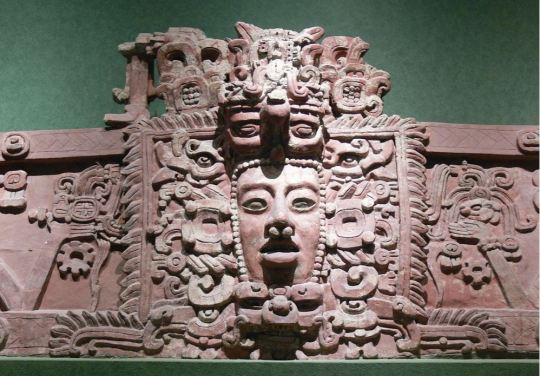
Even if you personally don't worship these Gods, at least respect the fact that your ancestors did. Imagine if 100-200 years from now your descendants start making movies and shows that demonize or humiliate Yahweh, Jesus, Allah and Mohammed, etc.!
In fact, neo-paganism is the fastest growing religion in the United States: https://commonwealthpolicycenter.org/paganism-is-americas-fastest-growing-religion/#:~:text=Paganism%20is%20one%20of%20the,a%20broader%20form%20of%20paganism.
Members of Ásatrù, heathen religion of Iceland, honoring the Norse Gods:

Members of Hellenism, honoring the ancient Greek Gods:
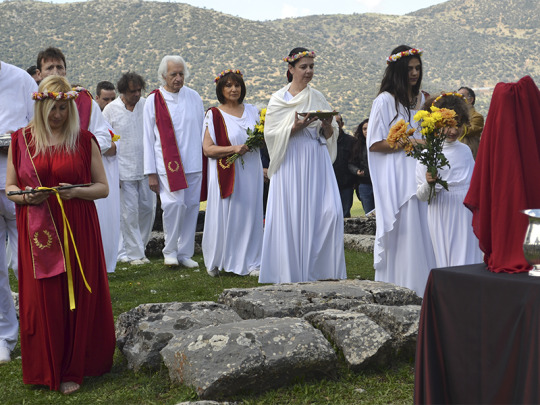
Members of my religion, Nova Roma, honoring the ancient Roman Gods:
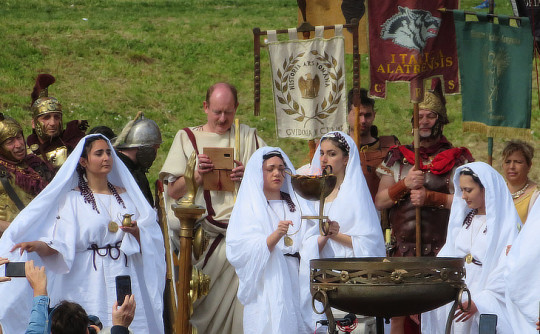
Traditional African religion:
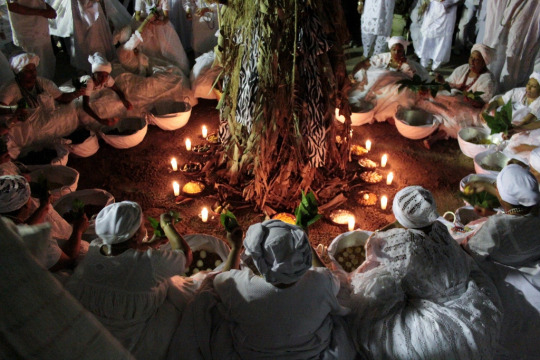
Traditional Maya religion:
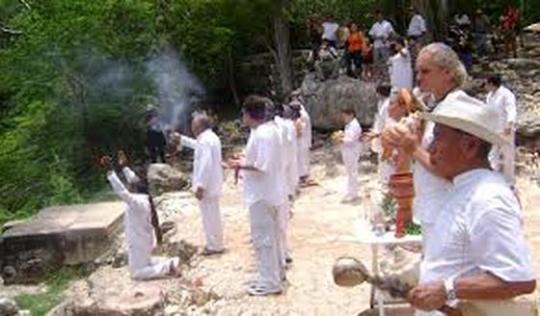
Members of Wicca at Stonehenge, the biggest Neo-Pagan religion in the world with 3-5 million practioners worldwide!
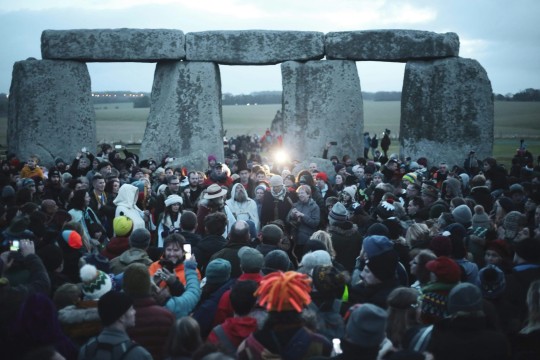
Our Gods are our RELIGION, not just your "mythology!" And both They and we, their followers, deserve the same respect you expect for your religions.
And they at least would never condemn you to an eternal fiery pit simply for not believing in them, unlike some other god I could mention.
They are here. We are here. They exist. We exist. And we are not going anywhere.
#pagan#paganism#mythology and folklore#roman polytheism#hellenic pagan#roman paganism#norse paganism#greek gods#roman gods#wicca#respect all faiths#coexistence#religion#religous themes
87 notes
·
View notes
Note
. . .Osiris
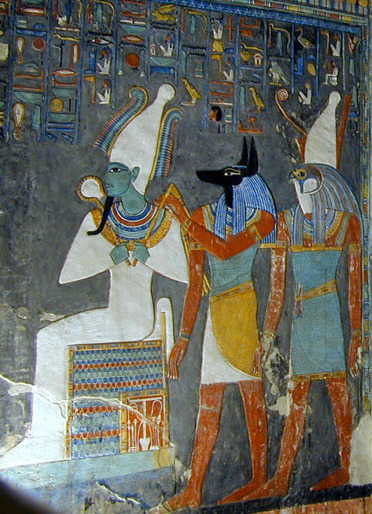
Osiris (Great and Beautiful is He) is the God of the Underworld; its King and Pharaoh ruling over the Duat. He is pictured here on the far left, His skin green and His body in mummiform. This is commonly how He is depicted; as a green-skinned, mummified man.
Son of Nut, the Sky Goddess, and Geb, the Earth God, Osiris was the first King of Egypt in accordance with Kemetic mythology, although there are stories that recount Geb, His father, being King before Him. There are a great deal of myths and stories that surround and involve Osiris, and I suppose it is important to at least skim over them before discussing hard facts about Him, as it gives some reference as to who He is and what the culture surrounding Him is like.
Osiris Myth
After the world was created, the Demiurge (who changes according to myth, and can be Neith, Ra, Amun, Ptah, or others) produces children; in the most popular form of this creation story, it is usually Ra who births the first Gods. They are Shu and Tefnut, Air and Moisture. Shu and Tefnut then form a union and birth two children of Their own: Nut and Geb, Sky and Earth. Nut and Geb were very much in love and refused to separate from each other, which, of course, caused a problem, because if the sky and the earth are eternally in contact, there is no space for anything to live and walk upon the earth. Ra made it so Nut and Geb were forever separated, by having Shu, air, stand atop Geb and hold Nut up as the sky. But Nut was already pregnant. When Ra discovered this, He was enraged, and forbade Nut from ever giving birth on any day of the year.
Nut cried to Djehuty (Thoth), and Thoth devised a plan. He went to Khonsu, God of the Moon, and set up a gamble, saying that every round of the game Senet Khonsu lost, He would have to give Nut some of His moonlight. Khonsu ended up losing so many times that Nut had enough moonlight for five days––five days that weren't in the calendar. This allowed Her to give birth on those five days, and on each day She had a different child; Ausir (Osiris), Wr-Heru (Horus the Elder), Sutekh (Set, Seth), Auset (Isis), and Nebet-Het (Nephthys). Nut and Geb were still forever separated by atmosphere (Shu), but the five Gods were birthed, and Osiris, as the eldest son, became King of the Living World.
As a side note, all Gods do have ancient Egyptian names which are different from Their Greek and now modern names. For convenience's sake, and to avoid confusion, I will use the names They are most known by; Their Greek/modern names. And as another side note, there are a lot of variations on this story. I will be piecing together a lot of different ideas but I will be leaving some things out for the sake of cohesion.
When Osiris came to Egypt, He found the people there to be chaotic and lawless. As King, He instituted laws and spread ma'at, which is truth, justice, harmony, and order. Egypt flourished under His rule and the people were incredibly happy, as all were equal, and with the fertility of the God-King, the crops were always bountiful and food was plenty. He brought not only law and prosperity, but also the right way to worship, and the teachings of agriculture.
Set, God of chaos, confusion, the desert, and of foreigners, and the youngest brother of the Ennead, grew to be quite jealous of His older brother. There are many variations and the most popular variation of this story comes from the end of the New Kingdom (1550-1070 BC), where Set fashions a fabulous coffin in the perfect measurements of Osiris, throws a party, and tells the party-goers that whomever the coffin fits may have the coffin as a gift. When Osiris fits perfectly, Set quickly shuts and bolts the coffin and throws it in the Nile (this version of the myth gives an origin to the idea that people who drowned in the Nile were holy). His coffin drifts downstream and into the Mediterranean, where it washes ashore in Phoenicia, in Byblos. The coffin wedges itself into a growing tamarisk tree, a tree which envelops the coffin. Eventually the tree is cut down and used as a pillar in the palace in Byblos.
Isis, Osiris' wife and sister, searched far and wide for Her husband, and did eventually find Herself in Byblos. The story is quite long and complicated, but in the end She convinced the King to give Her the pillar, and when she returned to Egypt, She hid Osiris in a swampy area of the Nile delta, and bade Her sister, Nephthys, to watch over Him while She went in search of healing herbs. But Seth heard that Osiris was back, and so after interrogating His sister-wife, Nephthys, He found Osiris, cut His body into pieces, and threw them into the Nile.
Isis was horrified at what transpired in Her absence, but She immediately set to work on finding the many pieces of Her husband with the help of Her sister, Nephthys. They managed to find every piece of His body except His phallus, which had been eaten by an oxyrhyncus fish, a fish that was thus forbidden to eat.
With the pieces of Osiris reassembled, and the healing powers of Isis in full power, Osiris was brought back to life, but incomplete. Isis assumed the form of a kite, and from above drew out the seed of Osiris, impregnating Herself with Their child: Horus the Younger. But Osiris, still incomplete, could not properly rule over the land of the living any longer.
This is why He is the ruler of the dead––He was once the king of the living, was killed, and was resurrected, and this is what every ancient Egyptian expected and hoped would happen to them: that they would die and be resurrected. In tombs and mortuary temples you will always see Pharaohs associating themselves with Osiris.
But this long myth I have just told you is not the only version of the story, and in my opinion, it is definitely the longest version of the story. Back in the Old Kingdom and Middle Kingdom there were several different versions; for example, Set's motive is different, ranging from revenge for Osiris kicking him, to revenge for Nephthys (Seth's sister-wife) sleeping with Osiris (which eventually births Anubis). Some texts claim that Seth took on the form of a wild animal, such as a crocodile or a hippopotamus, and killed Osiris that way. In others, Osiris is drowned. In some, the steps surrounding the coffin are skipped, and Osiris is simply cut up, and His pieces scattered around Egypt; a version which explains the many cult centers of Osiris claiming to be a place where Osiris is buried. Osiris' resurrection is also often helped along by other Gods such as Thoth (God of wisdom) and Anubis (God of embalming). In some versions, Set is killed for His actions. In most He is simply defeated and driven from the land, as chaos is necessary for balance and harmony, and thus cannot be killed. And the story that I have told is from the Late Period, recorded by Plutarch, and does not really go along with many Egyptian accounts, which often find Osiris' penis intact.
So that is the Osiris myth with all of its' intricacies and changing rhythms over the course of 4,000 years of Egyptian history. It embodies a huge amount of cultural practices and religious ideas within ancient Egypt, including the idea of truth, harmony, and justice, as well as resurrection, the afterlife, healing, and the workings of the cosmos. I've decided to leave out the later parts involving Osiris' son, Horus, and His fight with Set, for now because this does not directly involve Osiris, and that is our topic for this post.
Tradition, History, and Culture
Worship of Osiris dates back to the Old Kingdom, but the idea of Osiris is likely older than this. Before Osiris was actually Khentiamenti, an agricultural God centered in Abydos, a city which would later become the cult center of Osiris. Khentiamenti means 'Foremost of the Westerners', a title for the ruler of the dead, as the dead resided in the west, where the sun set each day. But Osiris Himself is not found mentioned in any texts or carvings until the 5th Dynasty, where He is depicted as a man wearing a divine wig. Later on He would take on the form we know Him best in––wrapped in a white mummy shroud, wearing an atef crown with ostrich plumes on the sides.
The mummy shroud He is depicted in forever associates Him with death and with the essential story behind Him, which is why I found it so important to start off with the Osiris Myth. This myth is also why He consumed and took the place of Khentiamenti; the name Khentiamenti, Foremost of the Westerners, instead became a title for Osiris as the King of the blessed dead. Another common epithet/name of Osiris is Wennefer (Omnophris), meaning 'The Beautiful One', 'The Beneficent One', and more archaically, 'One Whose Body Did Not Decay'. Among these names He was also called 'The Lord of Love', 'The King of Living', and 'The Eternal Lord'. From the Early Dynastic Period up until the end of the Ptolemaic Dynasty, when Rome conquered Egypt, Osiris was one of the most highly worshipped and revered Gods of Egypt.
Osiris was associated with the Nile river, with its' renewal and life-giving abilities, as one of Osiris' domains and powers was fertility, as well as rebirth. Another of His duties, evidence of which originates in the New Kingdom, was to act as judge of the dead; being King, He sat on the tribunal with the 42 Judges in the famous Weighing of the Heart ceremony. In this ceremony, which took place in the afterlife, the deceased would have to stand before the court and place their soul up for judgement. If it weighed lighter than the feather of Ma'at, representing all justice, truth, and harmony, then the heart acted well in life and would be allowed eternal happiness in the Field of Reeds. If not, the heart, and thus the person, would be consumed by Ammit and committed to nothingness. So Osiris would sit in on this tribunal and judge who entered His kingdom, as it was His domain. In this role, and in His role as King of the Living, as well, He was the embodiment of harmony, law, and justice.
"Most of his appeal was based on his embodiment of the cosmic harmony. The rising Nile was his insignia, and the moon’s constant state of renewal symbolized his bestowal of eternal happiness in the lands beyond the grave. In this capacity he also became the model of human endeavors and virtues..." (The Complete Gods And Goddesses Of Ancient Egypt, p.307)
As I mentioned earlier, Abydos became His cult center, as it was the cult center of the God who came before Him, whose traits He subsumed. It became a very popular burial site, as legends would say that Abydos was where Osiris was truly buried, and the people wanted to be buried as close as possible to Osiris. At one point they believed an ancient tomb there––which was actually the tomb of an Early Dynastic King––to be the tomb of Osiris, which they much revered, and left so many offerings in clay pots that Arabs would later call the site 'Umm el Qa'ab'; Mother of Pots. But this was not the only burial site of Osiris; since many variations of the myth include Set chopping up and dismembering Osiris into many parts, ranging from 14 to 42 different parts. These parts were scattered across Egypt, so many cities and nomes could claim that they had a part of Osiris buried in their domain. For example, far in the south, the island of Bigah claimed to be the burial site of Osiris' left leg, and thus the source for the yearly Nile inundation.
Going back to the Osiris Myth, after Osiris died and became the ruler of the dead, His son took His place as King of the Living: the falcon God, Horus (Heru the Younger). After the brief bout of chaos brought about under Set's rule, Horus took over (after much deliberation from the Gods) and order was restored. Because of this story, Pharaohs would not only associate themselves with Osiris in death, but with Horus in life. Each Pharaoh, as they came to the throne, would become the living embodiment of Horus on earth, the son of Osiris. In this way, Isis was also the mother of every Pharaoh, and their protector. And, to added extent, each Pharaoh would have a personal name, and then a Horus name granted to them when they ascended to the throne.
"It is for this reason that Osiris is so often depicted as a mummified pharaoh; because pharaohs were mummified to resemble Osiris. The image of the great mummified god preceeded the practice of preparing the royal body to look like Osiris... The king's appearance as modeled after Osiris' extended throughout his reign; the famous flail and shepherd's staff, synonymous with Egyptian pharaohs, were first Osiris' symbols as the flail represented the fertility of his land while the crook symbolized the authority of his rule." (Osiris, World History Encyclopedia, Joshua J. Mark)
Osiris can also be represented by a number of physical symbols, such as the crook and flail that He carries in almost all representations of His earthly form. The crook, which is the striped hook He carries, represents power/authority, and is a symbol of the Pharaoh. The flail, which is the instrument in His other hand, represents the fertility of the Nile, and as an extension, the fertility of Osiris Himself. But the crook and flail, though both seen typically as symbols of Pharaonic power, are actually the tools of a shepherd. There is reasonable evidence, thusly, to suggest that the physical origins of the idea of Osiris may not be that of a great King, but of a ruler of a shepherd tribe in the Nile Delta, whose rule was so beneficent that it led to him being worshipped as a God. For Egyptologists, this theory comes from His association with Andjety, a predynastic God-King worshipped in the Delta who also bore the crook and flail as His symbols. This, however, has not and likely cannot be fully proven. But the postulation is still interesting nonetheless!
Osiris' ba soul had its' own culture of worship, a practice of soul-worship that is prevalent in the cults of several other Gods, such as Hathor (HwtHer). In this form, Osiris was known as Banebdjedet, meaning 'The Ba of the Lord of the Djed,' which in English terms means 'The Soul of the Lord of the Pillar of Continuity', as ba means soul, and djed is the symbol for a pillar, which represented the backbone of Osiris. Interestingly, the name Banebdjedet is feminine, as the letter t denotes a feminine word or name in ancient Egyptian; although there are also variations on this name that exclude the t in favour of the alternative, Banebdjed. Banebdjedet, Osiris' ba soul, was worshipped mainly in Mendes, a city in Lower Egypt, in the Delta.
This leads to an interesting point concerning the androgyny of Osiris, a subject I found while researching for this post. Osiris' fertility comes from His castration and then being healed by the mother Goddess, Isis. Not only that, but both men and women identified themselves with Osiris in death. Then the name for His ba personified as another God is feminine, although representations of Banebdjedet are overwhelmingly male. Before anyone attacks me, I am not claiming that Osiris is a genderless God or King––just that He has some traits of androgyny, which I find interesting and love to study in ancient cultures, and I thought it would be good to mention for anyone else similarly interested.
Worship, Festivals, and Cult Activities
When it comes to the practices surrounding Osiris' cult, we actually know a good deal of information regarding the activities of worshippers and priests. Osiris' cult and worship was so widespread and lasted long enough that it could be recorded by the earliest Greek historians, and remained carved in temple walls for thousands of years. Among the most well-known cultic tradition is the Osiris Bed.
The Osiris Bed is rather well documented, as it was an object placed in tombs. It was not a bed for the deceased to lie in, but instead a box made of wood or clay, moulded into the shape of Osiris, in which the fertile Nile soil was placed and seeds were planted. These boxes were then wrapped in white mummy linens, and the seeds sprouted through, representing the resurrection and fertility of Osiris, and the crops that grew each year in cycles. One of the most famous of these beds was found in King Djer's tomb, a King from the Early Dynastic Period; the 2nd King ever of the unified Egypt. Coincidentally (or, perhaps, not so coincidentally) King Djer's tomb was the tomb which pilgrims believed to be Osiris' burial site.
While the Osiris Bed is far from the only practice and tradition of the Osiris cult, it does show the rich cultural practices and symbolism present in His worship. Let's look at some other examples of the practices of Osiris' cult.
Similar to the Osiris bed were Osiris gardens, which were essentially the same concept; fertile soil was planted inside a vessel shaped into the form of Osiris, and seeds were settled within to grow. These beds were tended to during festivals instead of being buried in a tomb.
There were a great many festivals, and each of them quite popular according to their time period, dedicated to the story and symbolism of Osiris. Some festivals started with recounting the mournings of Isis and Nephthys, Osiris' sister-wife and sister, in the form of a drama acted out in a call-and-response format. Another drama acted out for the glory of Osiris was more in the form of an actual fight that anyone could participate in; it was modelled after The Contendings of Horus and Set, which I briefly mentioned as a long and drawn-out argument between Horus and Set over who deserved Osiris' vacant throne after He had died. On this occasion, people would battle out and reenact the events of the story until the side of Horus finally won and victory was achieved. Afterwards, the celebrations commenced in honoring the restoration of order, and the gold-encased shAwyt-nTr (the Holy Statue) of Osiris would be taken out and lavished with offerings. Osiris, in the form of this statue, would be paraded throughout the city of Abydos before being placed in a shrine outside, where He could participate fully in the festivities, and be admired by the commoners who would usually never behold the face of Osiris. This emergence of Osiris from the dark temple's inner sanctuary to the light of the city resembled and represented His resurrection from death into life again. Although this particular festival was celebrated mainly in Osiris cult center of Abydos, it was also celebrated in other cities such as Bubastis in the Delta, Busiris, Memphis, and Thebes, in Upper Egypt.
The Mysteries of Osiris was a series of plays performed annually, and in dramatic, passionate form. It was one of the most popular observances of worshippers, and it told the story that I first told to you––of Osiris' life, His death at the hands of His brother, His resurrection at the hands of His sister-wife, and His ascension into the role we now know Him for. The roles in this reenactments were often taken up by high-ranking officials, and afterwards, the Contendings of Horus and Set would take place, which I just mentioned. These plays would take place over several days.
One festival was called The Fall of the Nile. During this time, the waters of the Nile would recede, and the worshippers of Osiris would go into mourning. One of Osiris' representation on earth was the Nile, and the Nile represented His fertility and life.
Another festival was celebrated on the 19th day of Pakhons, one of the months in the Egyptian calendar, which is roughly equivalent to May in our Gregorian calendar. On this day, the followers of Osiris would go to the river with shrines containing vessels of gold and metal, and would pour water into the Nile, exclaiming, "Osiris is found!" Mud and spices were mixed and moulded into the shape of Osiris, as well, to celebrate His return. Another festival similar to this one was called The Night of the Tear, and took place during modern-day June.
The last festival pertaining to Osiris that I will mention is the Djed pillar festival, held in modern-day January. The Pharaonic court and family would participate, raising djed pillars to welcome Osiris and the harvests that coincided with His return.
One last and interesting tradition that may seem familiar to Christians, at least in a small way, was the baking of bread in the shape of Osiris; bread as the flesh of the God, a sort of predecessor of communion wafers. But in reality the traditions of the Osiris cakes are completely different, and there were several different ways of going about it, depending on which nome you were from. In Dendera, wheat-paste models were made in the shape of each of the 16 dismembered parts of Osirs, and each model was sent out to the town where each respective part of Osiris was found by Isis. In Mendes, figures of Osiris were made of wheat and paste. On the day of the murder, they were placed in a trough, followed by water being added each day for several days. Afterwards, this mixture was kneaded into a dough, put into a mold of Osiris, and buried on the temple grounds.
Conclusion
This has been a somewhat brief glimpse into the cult, history, and traditions surrounding the Great God, The Beautiful Lord Osiris. If I can clarify anything please let me know and I will do my best!
#Osiris#ancient egypt#egyptian mythology#egyptian gods#Kemetic#ancient history#egyptology#Kemeticism
238 notes
·
View notes
Text
Little Yellow Emperor: the Life of Napoleon in LEGO
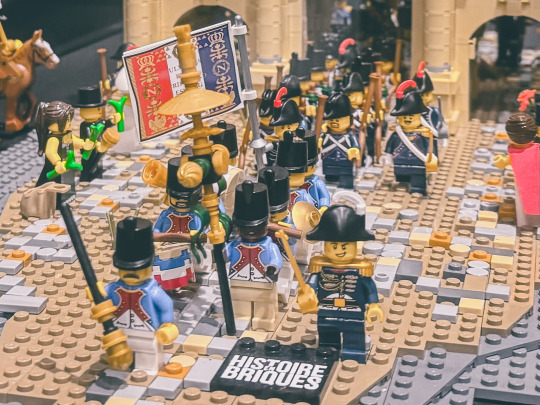
The Battle of Waterloo Domain is hosting a LEGO exhibit called "THE LEGEND OF NAPOLEON IN LEGO BRICKS." As a recovering LEGO addict and an eternal fan of 18th/19th-century French history, I simply had to go. After successfully bribing the husband with beer and fries and the children with waffles, we made the trip today.
The exhibition was smaller than I expected, but some of the builds were genuinely impressive. It traces Napoleon's life from his birth in Corsica to his death on Saint Helena—a neat, bite-sized way to introduce his story, and a fun way of recreating history. However, one thing that did bug me a bit: while the audio guide is available in multiple languages, all the wall texts are in French. In a trilingual country, especially at such a touristy site, that feels like a bit of a miss (plus, it gave the Dutch-speaking husband an excuse to grumble).
Gripes aside (1), the exhibit was a lot of fun. Here are my favourite builds.
1. The Campaign in Egypt
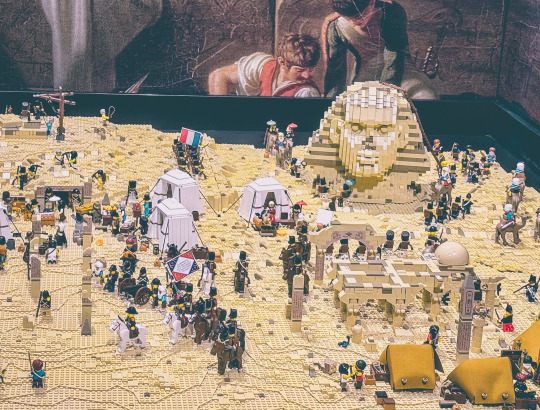
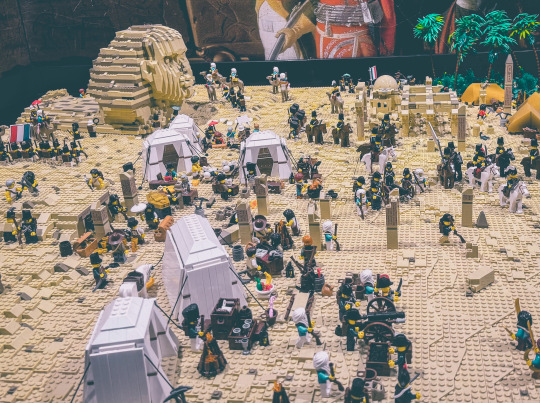
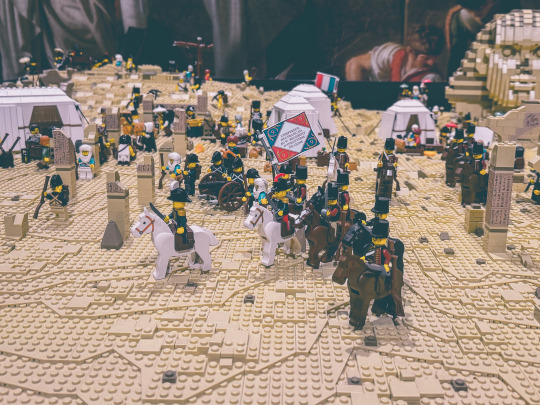

This recreation of Napoleon’s Egyptian campaign is absolutely brilliant. The photos don’t do it justice—every detail, from the Sphinx to the busy French camp, is spot on. It's also huge and apparently took close to 70 hours to build! @chickenmadam can you spot Kléber?
2. Napoleon's Coronation as Emperor
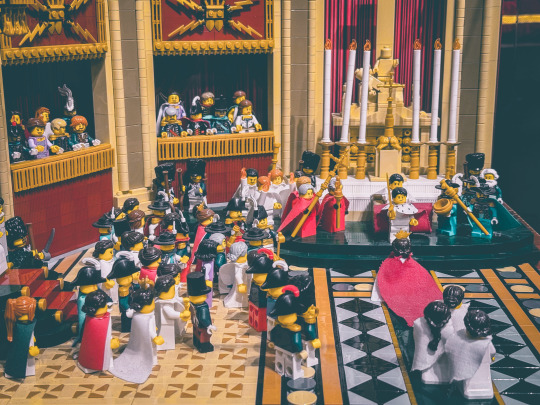
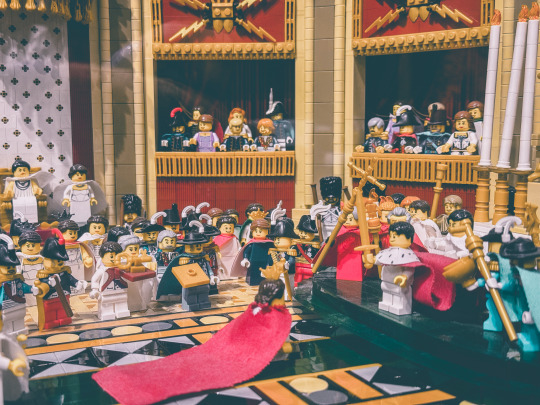
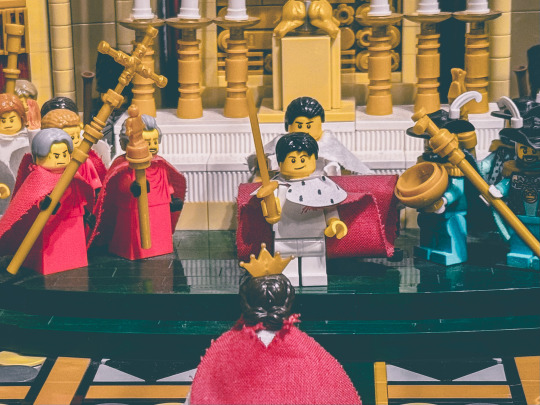
The second build, depicting Napoleon's coronation, may be smaller, but it's full of impressive details. I especially loved the grumpy expression on Pope Pius VII’s face, along with the equally unimpressed looks from the rest of the clergy—it really adds character to the scene!
3. The Coup on 18th Brumaire
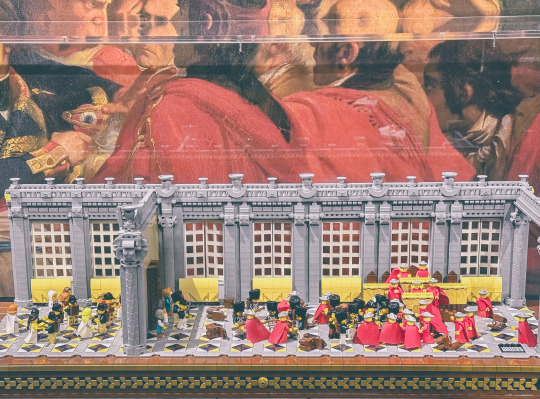
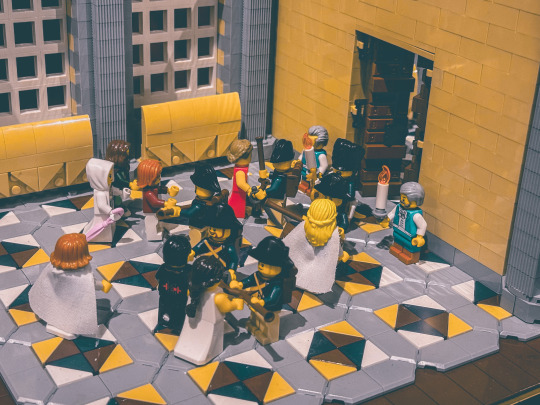
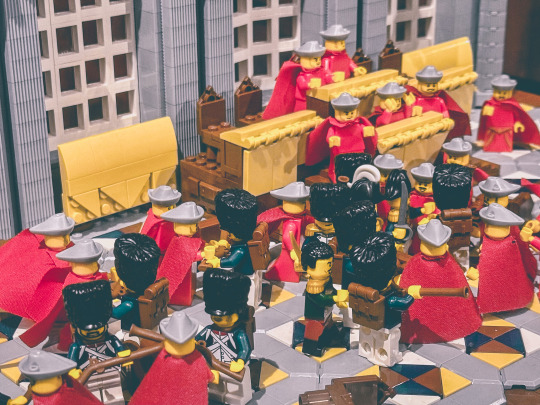
Again not a very big build but... those red capes... the hats... the outfits —need I say more?
4. Napoleon asks Josephine for a Divorce
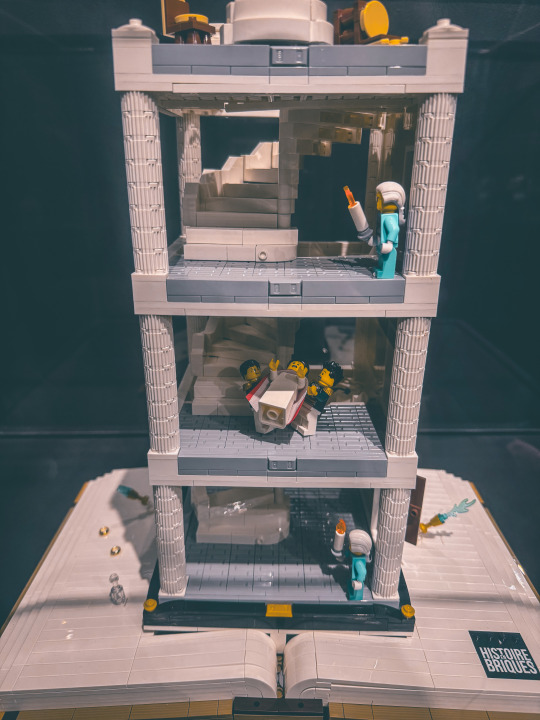
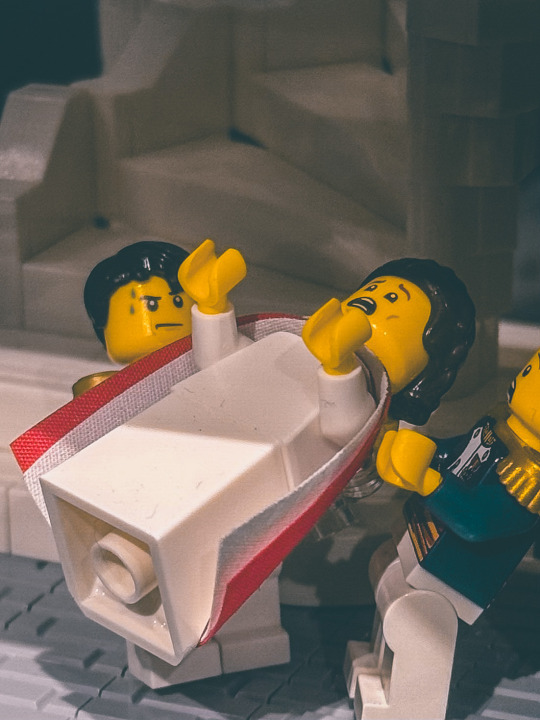
This moment is supposed to be, by all accounts, heart-wrenching for everyone involved—Napoleon asking Josephine for a divorce. But, since it’s LEGO, it ends up looking unintentionally hilarious.
5. The Crossing of the Berezina River
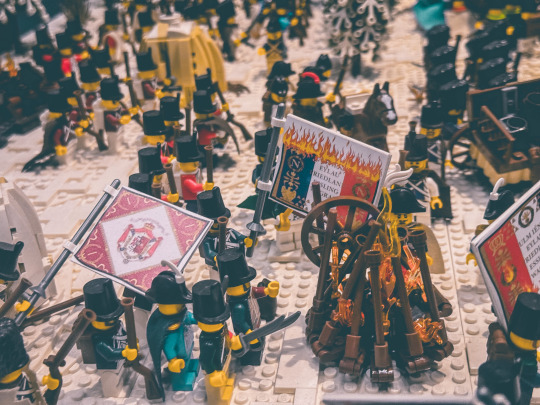
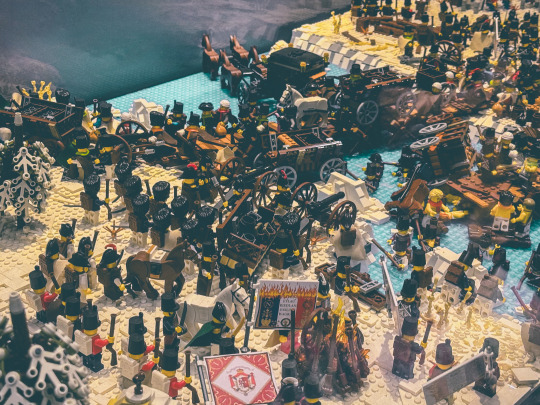
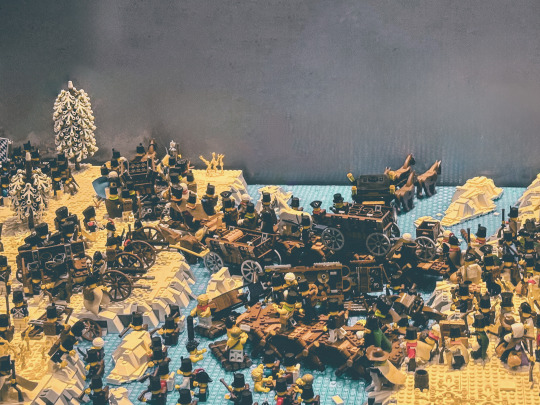
This is another brilliant build, capturing what was arguably Napoleon's greatest military disaster. While it's not as large as the Egypt campaign scene, it’s packed with intricate details that make it just as interesting.
6. Napoleon's Civil Code
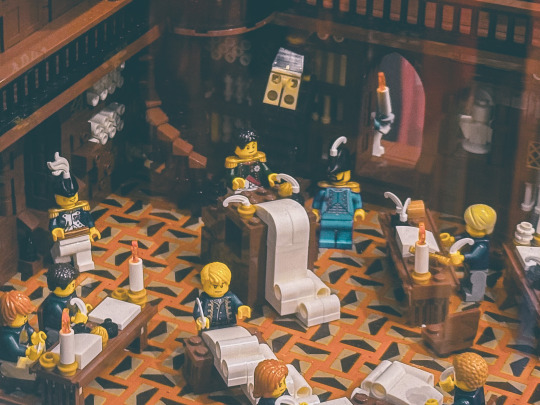
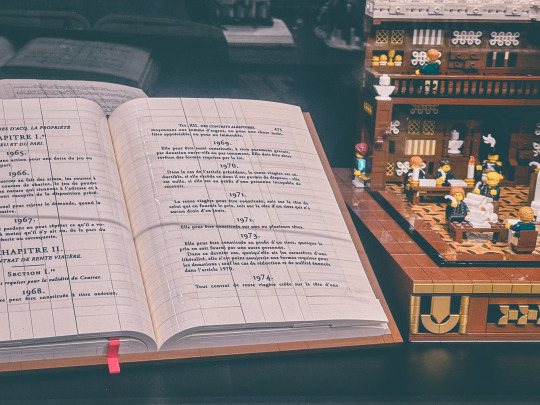
Yes. He has a GIANT parchment.
7. Daddy Napoleon and his son
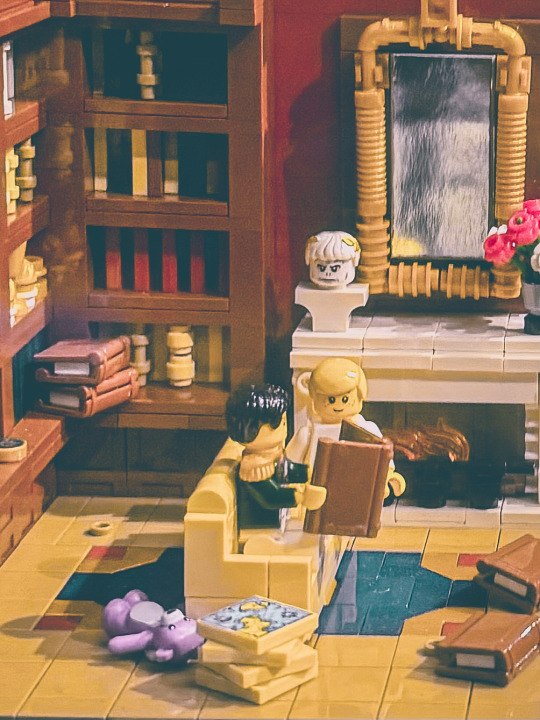
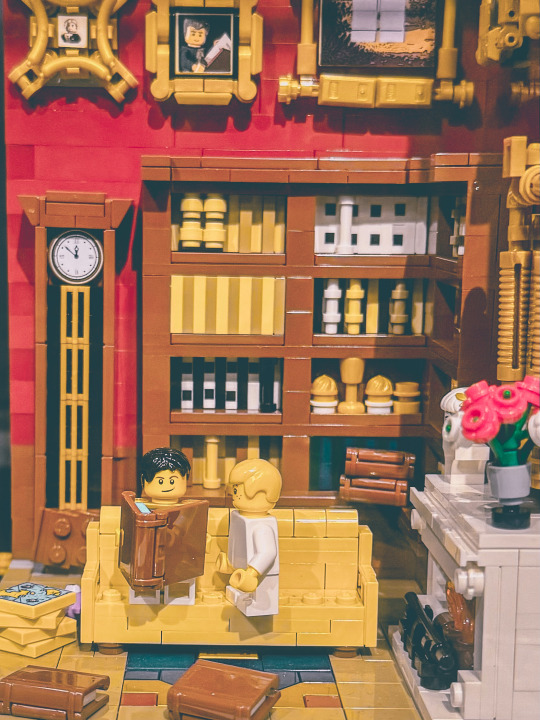
Because the King of Rome has a purple teddybear and a grumpy statue of his dad in his room...
Bonus: The Battle of the Arcole Bridge
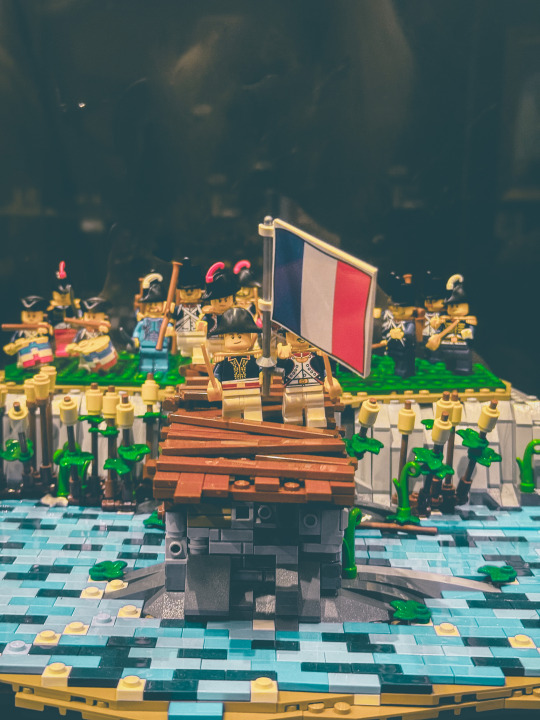
Not particularly impressive per see as a build, but this is one of my favourite moments in Napoleon's story, so... why not?
Notes
(1) Yes, they recreated the siege of Toulon. No, Bonbon isn't in it. That makes me sad.
#frev#napoleonic era#napoleon bonaparte#napoleon#history#lego#napoleon ii#french revolution#amateurvoltaire’s travel diary
79 notes
·
View notes